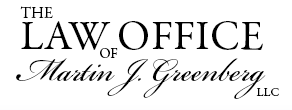By Martin Greenberg & Jordan Lysiak
- Introduction
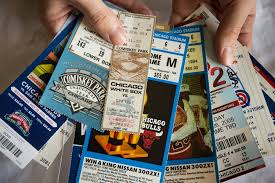
When the St. Louis Rams (Rams) made their move to Los Angeles during the 2016 National Football League (NFL) offseason, a state of uncertainty was sparked amongst season ticket holders, and left season ticket holders asking: do the Rams, or any other NFL organization, have a right to retroactively revoke access to season tickets?[1] Further, do the season ticket holders hold a property right to their tickets, making it improper for the Rams to take them?[2] Understandably the season ticket holders were left in a state of limbo, attempting to comprehend how the tickets that they previously purchased and controlled could simply be swept off to Los Angeles along with their beloved Rams.
Rams season ticket holders have brought their case forward, arguing that they held these tickets for many years, having a property interest in the tickets, or that they somehow held a reasonable expectation to renew their season ticket subscription and that the Rams cannot restrict their access.[3] Putting these questions aside, the starting point for many of the disgruntled Rams fans in St. Louis should begin and end with their season ticket holder Agreement.[4] The Agreement’s terms and conditions, establishes the level of authority that the season ticket holder has in a situation such as this one.[5]
Fortunately (or unfortunately) for the former season ticket holders in St. Louis, decisions to revoke season tickets is not a novel issue in sports, let alone the NFL.[6] Court cases from the 1990s to today have ruled on this issue, sometimes varying in opinion, but always arising under the concerns of former season ticket holders.[7]
With this article, we hope to provide a sense of understanding surrounding the difference between the rights of those who hold a single-game ticket, season tickets, or a personal seat license. Further, we look to provide insight and a unique perspective into the recently-settled lawsuit between the Rams and their former St. Louis season ticket holders about the agreements that were entered into between the two parties, making sense of the frustrations held by these long-time football fans.
- The Single-Game Ticket
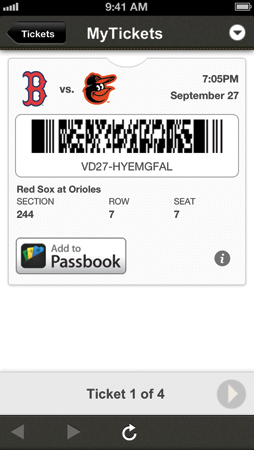
Gaining access to a sporting event requires only one thing: a ticket. With this ticket, fans are afforded rights while they are spectators at the event; these rights include a right of entry to the event and access to a specifically marked or designated seat.[8] While the ticket affords rights to the fan, restrictions are found on the reverse-side of the ticket. The ticket, while it does provide access to the event, is in fact a revocable license (a grant of consent to use another’s property that can be revoked by the licensor at any time with or without cause), where the organization or team has the right to revoke a fan’s access to the event at any time, for any reason.[9]
When a fan purchases a ticket to attend a sporting event, they are simply making a purchase of a license granted to them “by the organization to see the specified contest . . . .”[10] The intent behind treating sporting event tickets as revocable licenses is simple; organizations are able to take any action they deem necessary to “promote their ideal environment” within the confines of the stadium.[11] The terms that are set out by the organizations on the reverse side of the ticket are intentionally left broad, and are agreed to by the fans upon purchase, affording the organizations the leeway that is desired to make a “for cause” revocation of the license.[12]
Here are some examples of the text found on the reverse side of tickets which explains to the fan that all tickets are a revocable license:
- Green Bay Packers:
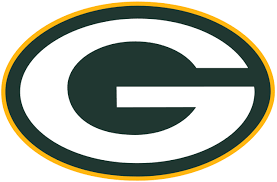
This ticket is a revocable license that only grants entry into the stadium and a spectator seat, or if specified on the ticket, a standing location, for the specified game. Admission may be refused of withdrawn or ticket holder ejected in the sole discretion of the Green Bay Packers, Inc.[13]
- Milwaukee Brewers:
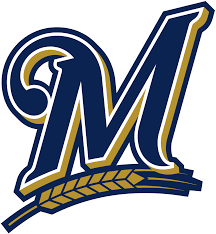
The license of admission to the event stated on the face of this ticket may be revoked without refund if the ticketholder is in violation of any Club policy. By the use of this ticket, the ticketholder agrees that he or she shall act in strict accordance with all club policies and rules, including the Fan Code of Conduct, which can be found on brewers.com.[14]
- Milwaukee Admirals:
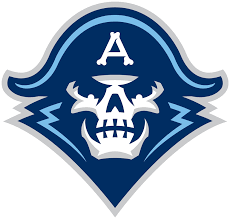
This ticket is a revocable license to attend the event listed on the front of the ticket and is subject to the full terms found at www.ticketmaster.com. Such licenses may be revoked without refund for noncompliance with terms. Unlawful sale or attempted sale is prohibited. Unauthorized use and/or duplication of this ticket, in whole or in part, without the express written permission of Ticketmaster or the event presenter is strictly prohibited.[15]
- Florida State University:
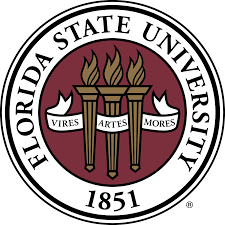
Florida State University reserves the unrestricted right to revoke the license granted by this ticket by an offer to refund the purchase price. It further reserves the right to eject, without refund any person on the stadium or arena premises who is intoxicated or is in the possession of alcoholic beverages.[16]
- Chicago Bulls:
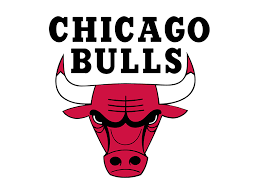
This ticket is a revocable license, which may be withdrawn and admission refused at any time upon refunding Holder the printed purchase price. Holder’s failure to comply with any of the following conditions will automatically terminate this license, and shall constitute grounds for denial of admission or removal from the United Center, cancellation of this ticket without refund, and shall render illegal the Holder’s use of this ticket for any purpose. Holder consents to and is subject to search. Holder shall not act in a disorderly manner. Holder shall not transmit or aid in transmitting any description, account, picture or other depiction, game information, or reproduction of the event, including pre- and post-event activities. Tickets may not be offered for resale in any manner that would violate any law or regulation.[17]
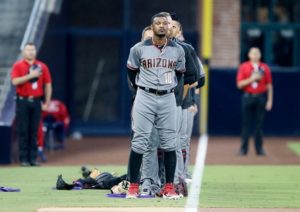
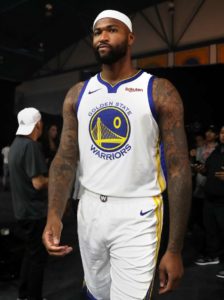
Much of the language on the tickets discuss that the license for a fan to attend a sporting event can be revoked due to the behavior of the fan. The language from the tickets speaks regarding an organization or venue’s code of conduct which creates behavior guidelines. Three of the largest sports leagues in the United States, the National Football League (NFL), National Basketball Association (NBA), and National Hockey League (NHL), have instituted their own universal fan codes of conduct. Regardless of the league, the same major principles of the organization or team fan code of conduct are mainly: respect, safety, and promoting an enjoyable fan experience. For example, the NFL, NBA, and NHL have made similar statements for the purpose behind implementing a fan code of conduct, and that is to better address and prevent any sort of behavior that may detract from the game day experience.[18] Any fan portraying such prohibited behavior is subject to immediate ejection without a refund, along with a loss of ticket privileges to future games.[19] Such intolerable and crude behavior was on display during a Major League Baseball (MLB) game between the Baltimore Orioles and the Boston Red Sox.[20] During the incident on May 1, 2017, a fan berated Orioles’ centerfielder Adam Jones with racial taunts during the course of the game, causing not only the fan at issue being banned for life from attending games at Fenway Park, but it also led to the league office creating a plan to establish the first set of universal code of conduct guidelines for the MLB sometime in the upcoming years.[21] Similar to what occurred at Fenway Park, just down the road at TD Garden Arena, the NBA’s Boston Celtics dealt with a similar situation when a fan directed racial slurs at the Golden State Warrior’s DeMarcus Cousins.[22] In response, the Celtics banned the fan for the remainder of the 2018-19 season and the entirety of the 2019-20 season.[23]
Below is the complete Fan Code of Conduct for the NFL, NBA, and NHL.[24]
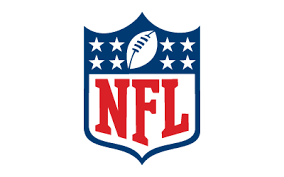 NFL Fan Code of Conduct[25]
NFL Fan Code of Conduct[25]
- The National Football League and its teams are committed to creating a safe, comfortable, and enjoyable experience for all fans, both in the stadium and in the parking lot. We want all fans attending our games to enjoy the experience in a responsible fashion. When attending a game, you are required to refrain from the following behaviors:
- Behavior that is unruly, disruptive, or illegal in nature.
- Intoxication or other signs of alcohol impairment that results in irresponsible behavior.
- Foul or abusive language or obscene gestures.
- Interference with the progress of the game (including throwing objects on the field).
- Failing to follow instructions of stadium personnel.
- Verbal or physical harassment of opposing team fans.
- Event patrons are responsible for their conduct as well as the conduct of their guests and/or persons occupying their seats. Stadium staff will promptly intervene to support an environment where event patrons, their guests, and other fans can enjoy the event free from the above behavior. Event patrons and guests who violate these provisions will be subject to ejection without refund and loss of ticket privilege for future games.
- The National Football League and its teams are committed to creating a safe, comfortable, and enjoyable experience for all fans, both in the stadium and in the parking lot. We want all fans attending our games to enjoy the experience in a responsible fashion. When attending a game, you are required to refrain from the following behaviors:
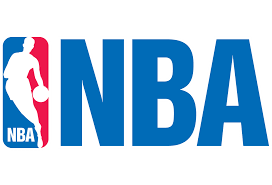 NBA Fan Code of Conduct[26]
NBA Fan Code of Conduct[26]
- The National Basketball Association and team arenas are committed to creating a safe, comfortable, and enjoyable sports & entertainment experience. NBA fans have a right to expect an environment where:
- Players will respect and appreciate each and every fan.
- Guests will be treated in a consistent, professional and courteous manner by all arena and team personnel.
- Guests will enjoy the basketball experience free from disruptive behavior, including foul or abusive language or obscene gestures.
- Guests will consume alcoholic beverages in a responsible manner. Intervention with an impaired, intoxicated or underage guest will be handled in a prompt and safe manner.
- Guests will sit only in their ticketed seats and show their tickets when requested.
- Guests will not engage in fighting, throwing objects or attempting to enter the court, and those who engage in any of these actions will immediately be ejected from the game.
- Guests will smoke in designated smoking areas only.
- There will not be any obscene or indecent messages on signs or clothing.
- Guests will comply with requests from arena staff regarding arena operations and emergency responses procedures.
- The arena staff has been trained to intervene where necessary to help ensure that the above expectations are met, and guests are encouraged to report any inappropriate behavior to the nearest usher, security guard or guest services staff member. Guests who choose not to adhere to these provisions will be subject to ejection without refund and revocation of season tickets and may also be in violation of city ordinances resulting in possible arrest and prosecution.
- The NBA and team arenas thank you for adhering to the provisions of the NBA Fan Code of Conduct.
- The National Basketball Association and team arenas are committed to creating a safe, comfortable, and enjoyable sports & entertainment experience. NBA fans have a right to expect an environment where:
- NHL Fan Code of Conduct[27]
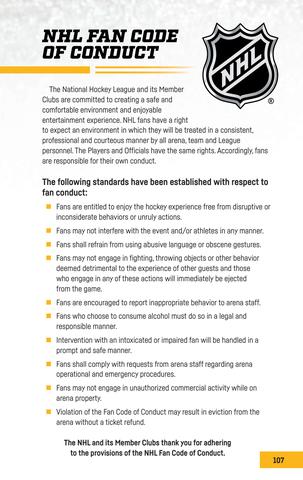
- The National Hockey League and its Member Clubs are committed to creating a safe and comfortable environment and enjoyable entertainment experience. NHL fans have a right to expect an environment in which they will be treated in a consistent, professional and courteous manner by all arena, team and League personnel. The Players and Officials have the same rights. Accordingly, fans are responsible for their own conduct.
- The following standards have been established with respect to fan conduct:
- Fans are entitled to enjoy the hockey experience free from disruptive or inconsiderate behaviors or unruly actions.
- Fans may not interfere with the event and/or athletes in any manner.
- Fans shall refrain from using abusive language or obscene gestures.
- Fans may not engage in fighting, throwing objects or other behavior deemed detrimental to the experience of other guests and those who engage in any of these actions will immediately be ejected from the game.
- Fans are encouraged to report inappropriate behavior to arena staff.
- Fans who choose to consume alcohol must do so in a legal and responsible manner.
- Intervention with an intoxicated or impaired fan will be handled in a prompt and safe manner.
- Fans shall comply with requests from arena staff regarding arena operational and emergency procedures.
- Fans may not engage in unauthorized commercial activity while on arena property.
- Violation of the Fan Code of Conduct may result in eviction from the arena without a ticket refund.
- The NHL and its Member Clubs thank you for adhering to the provisions of the NHL Fan Code of Conduct.
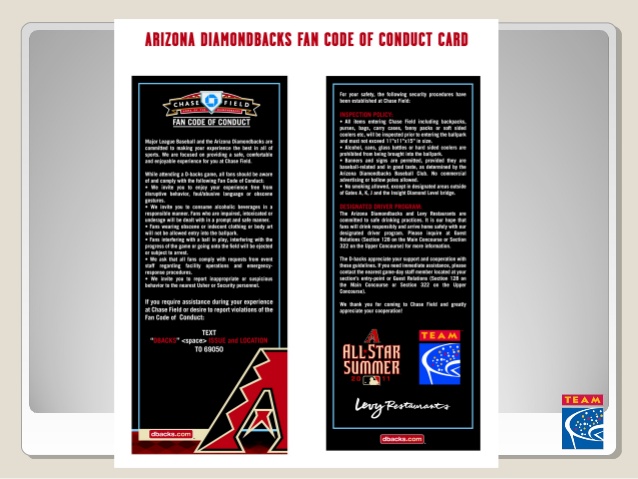
- MLB Fan Code of Conduct
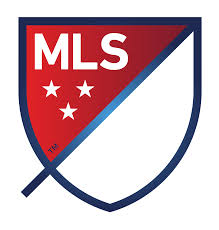
- According to reliable sources, the MLB itself does not publish its own Fan Code of Conduct, but rather the league makes recommendations to the clubs. Then the clubs themselves create their own Fan Code of Conduct.
- MSL Code of Conduct[28]
- Major League Soccer, its Clubs and its venues are committed to creating a safe, comfortable, and enjoyable soccer experience for all guests in and around our stadiums and facilities.
- MLS and its Clubs will immediately action the following behaviors as they represent a threat to the safety of the event:
- Fighting and/or inciting others to fight or inciting or engaging in unruly or disruptive behavior
- Causing significant damage to property
- Using (including on any sign or other visible representation) political, threatening, abusive, insulting, offensive language and/or gestures, which includes racist, homophobic, xenophobic, sexist or otherwise inappropriate language or behavior
- Threatening and/or abusive behavior directed towards other fans, players, officials or staff members will be subject to sanctions even if done outside the time period of a MLS-SUM event (including on social media)
- Entering or attempting to enter the field, the field track, the tunnel or any otherwise restricted area
- Possession or use of an unauthorized pyrotechnic device, smoke or firework, or attempting to introduce one inside the venue.
- Throwing any objects onto the field (including streamers)
- Failing to follow directions from venue staff regarding compliance with the Fan Code of Conduct, stadium policies and emergency procedures
- Declining to promptly return a ball that enters the stands
- Inappropriate consumption of alcoholic beverages, which includes purchasing for, possession of, or consumption by a minor
- The listed behaviors are prohibited based on safety and violations and will be subject to sanctions.
With the league-wide fan code of conduct, or team-created code of conduct, being a standard across professional sports, fans are required to not only understand the demands of the league offices, but also the expectations of the individual team’s fan code of conduct. While the general concepts of the team’s fan code of conduct are similar to that of the league-wide rules, many teams choose to get somewhat more specific with what they ask of the fans as a way to not only promote a fun and safe environment, but to also assist their own employees in better performing their jobs. Below are a few examples from fan codes of conduct from various teams from the NFL, NBA, and MLB.
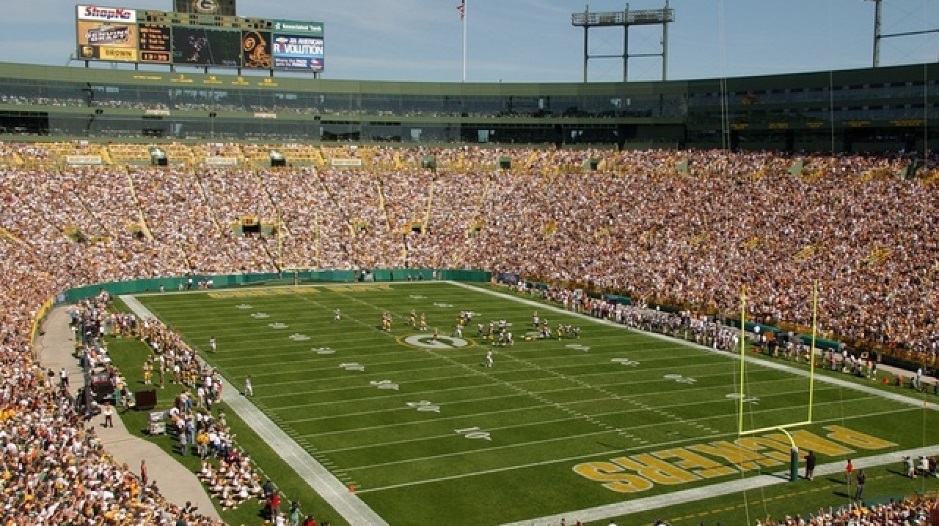 Green Bay Packers[29]
Green Bay Packers[29]
- The following will not be tolerated: Lambeau Field is a smoke-free facility. Behavior that is unruly, disruptive or illegal in nature. Intoxication or other signs of alcohol impairment that result in irresponsible behavior. Foul or abusive language or obscene gestures. Interference with the purpose of the game. Failing to follow instructions of stadium personnel. Verbal and physical harassment of opposing team fans. Any other conduct deemed to be beyond the bounds of reason.
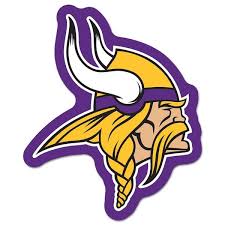 Minnesota Vikings[30]
Minnesota Vikings[30]
- To insure that all fans have a pleasant game-day experience, each patron should act responsibly and be considerate of others. Unruly behavior will not be tolerated and, in some cases, may be deemed grounds for dismissal from the stadium. These cases include, but are not limited to:
- Being under the influence of drugs or alcohol. Actions that are harmful to or endanger others. Wearing obscene or indecent clothing. Sitting or standing in the aisle ways. Failure to follow instructions or stadium security personnel. Harassment of visiting team fans.
- To insure that all fans have a pleasant game-day experience, each patron should act responsibly and be considerate of others. Unruly behavior will not be tolerated and, in some cases, may be deemed grounds for dismissal from the stadium. These cases include, but are not limited to:
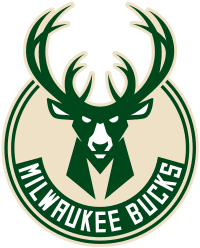 Chicago Bulls and Milwaukee Bucks[31]
Chicago Bulls and Milwaukee Bucks[31]
- The National Basketball Association, Chicago Bulls/Milwaukee Bucks, and the United Center/BMO Harris Bradley Center are committed to creating a safe, comfortable, and enjoyable sports and entertainment experience. NBA fans have a right to expect an environment where:
- Players will respect and appreciate each and every fan.
- Guests will be treated in a consistent, professional and courteous manner by all arena and team personnel.
- Guests will enjoy the basketball experience free from disruptive behavior, including foul or abusive language or obscene gestures.
- Guests will consume alcoholic beverages in a responsible manner.
- Guests will sit only in their ticketed seats and show their tickets when requested.
- Guests will not engage in fighting, throwing objects or attempting to enter the court, and those who engage in any of these actions will immediately be ejected from the game.
- Guests will smoke in designate smoking areas only.
- There will not be any obscene or indecent messages on signs or clothing.
- Guests will comply with requests from arena staff regarding arena operations and emergency response procedures.
- The National Basketball Association, Chicago Bulls/Milwaukee Bucks, and the United Center/BMO Harris Bradley Center are committed to creating a safe, comfortable, and enjoyable sports and entertainment experience. NBA fans have a right to expect an environment where:
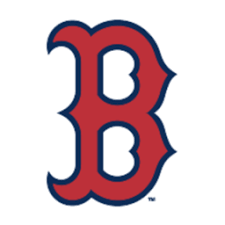 Boston Red Sox[32]
Boston Red Sox[32]
- Red Sox Nation takes pride in the Fenway code of conduct. Here are the nine items on the lineup card:
- Avoid balls in play.
- Never trespass onto the field.
- Drink responsibly.
- Help keep Fenway Park clean.
- Refrain from offensive language and hate speech.
- Be respectful to others.
- Keep cell phone conversations private.
- Sit only in your seats.
- Do not use tobacco in Fenway Park.
- Red Sox Nation takes pride in the Fenway code of conduct. Here are the nine items on the lineup card:
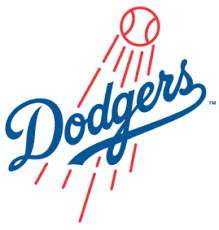 Los Angeles Dodgers[33]
Los Angeles Dodgers[33]
- Welcome to Dodger Stadium! Please read the following Fan Code of Conduct. Violation of this code may be grounds for denial of entry into the Stadium or ejection from the Stadium, revocation of tickets (including season tickets) without refund and/or arrest and prosecution.
- Be courteous to other fans. Do not disrupt other fans with disrespectful, unruly, or hostile actions or behavior. Inappropriate behavior should be reported to the nearest usher, security or other Dodger personnel, or to the Dodgers’ Hotline by calling (323) 224-2611 or by sending a text message to 69050 using the keyword LADFAN.
- Do not go onto the field, throw objects onto the field or interfere with balls in play.
- Sit in your ticketed seat only. Tickets must be shown to Dodger personnel upon request.
- Comply with requests from Dodger personnel regarding Stadium operations and emergency response procedures.
- Be courteous to the residents of the neighborhoods surrounding the Stadium when entering and exiting the Stadium.
- Tailgating is prohibited. Please do not consume food and alcoholic beverages in the Stadium parking lots before, during or after a game.
- Alcoholic beverages must be consumed in a responsible manner. Anyone who appears to be impaired by or under the influence of alcohol or a controlled substance may be denied entry to or ejected from the Stadium.
- Alcoholic beverages may not be brought onto the Stadium premises.
- Smoking is prohibited in all areas of the Stadium except in designated areas. The use of smokeless tobacco products is also prohibited in all areas of the stadium.
- Possession and/or use of marijuana on the Stadium premises is prohibited.
- Guns, weapons, cannabis, illegal drugs and other materials deemed hazardous or dangerous by Dodger personnel are prohibited.
- Foul/abusive language and obscene gestures are prohibited.
- Obscene or indecent clothing is prohibited. Footwear is required at all times.
- No signs or banners of any kind are allowed in the Stadium. Clothing or other items may not be hung over the railing.
- All persons entering the Stadium are subject to reasonable search to protect the safety of the public and to ensure compliance with this Fan Code of Conduct.
- All persons entering the Stadium will be expected to abide by all applicable federal, state and local laws.
- Items intended for sale or trade may not be brought onto Stadium property, including the parking lots without a permit, concession license or lease from the Dodgers.
- The unauthorized resale of tickets in, on or around the Stadium property is not permitted under any circumstances and is prohibited by law. Persons caught selling tickets in violation of the law may have their tickets and their right to future tickets to the Stadium revoked. To avoid using counterfeit or stolen tickets, please purchase tickets through authorized Dodger ticket outlets only.
- Welcome to Dodger Stadium! Please read the following Fan Code of Conduct. Violation of this code may be grounds for denial of entry into the Stadium or ejection from the Stadium, revocation of tickets (including season tickets) without refund and/or arrest and prosecution.
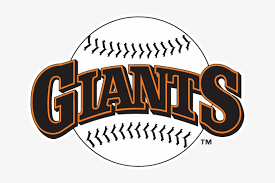 San Francisco Giants[34]
San Francisco Giants[34]
- Please remind guests that Giants staff and the San Francisco Police Department will enforce the following ballpark rules:
- No alcohol (this includes non-alcoholic beer and wine) or illegal drugs may be brought into AT&T Park. Anyone found drinking under the legal age, using illegal drugs, or breaking any other laws, will be subject to immediate ejection and criminal prosecution. Any guest perceived to be in an intoxicated or impaired state may be denied admission to the park.
- AT&T Park is a Smoke-Free ballpark. Electronic smoking and smoking by vaporization are included in this “Smoke-Free” designation and are prohibited. Guests who fail to comply with AT&T Park’s No-Smoking policy may be asked to exit the ballpark.
- The Giants are proud of the rich diversity of our fan base who cheer us on at AT&T Park. It is in this spirit that we urge all fans to be mindful and respectful of each other. Any fan wearing culturally insensitive attire, using obscene or abusive language, engaging in antisocial conduct offensive to those around them or displaying any other offensive behavior is subject to removal from the ballpark. If you observe a fan acting in this manner, please contact Giants security by texting the word “FOUL” to 69050, followed by your message. Please do not take the matter into your own hands.
- Guests entering the playing field, or who throw (or attempt to throw) objects, with the exception of home run balls, in the stands or onto the field, are subject to ejection and criminal prosecution. Fans interfering while a ball is in play are subject to ejection.
- Guests should keep their ticket stubs with them at all times. Guests are encouraged to place children’s ticket stubs in the child’s pocket or pin them to a shirt or jacket. Tickets must be shown to any and all ballpark employees and SFPD personnel upon request.
- Sealed plastic bottles and soft-sided juice containers containing non-alcoholic beverages are allowed in AT&T Park. Unsealed plastic bottles and soft-sided containers will be subject to inspection and may be confiscated. Glass and metal cans are not permitted. Alcoholic beverages cannot be brought into the ballpark.
- Items intended for sale or trade may not be brought onto AT&T Park property, including the main parking lot, without a permit or license.
- Air horns are prohibited in the park. These items may be confiscated.
- Tailgating is allowed only in specially designated areas of the AT&T Park parking lot, or on the space occupied by the guest’s car. Only one parking space is allowed per vehicle.
- Large bags or containers measuring OVER 16” x 16” x 8” are NOT allowed into the ballpark. All permitted bags, including purses, briefcases, and diaper bags (smaller than 16” x 16” x 8”) may be searched before entering the park. Fans are encouraged to arrive early to allow additional time when entering the park. Per MLB guidelines, NO HARD-SIDED coolers will be allowed. Soft-sided coolers are permitted. All bags and containers are subject to search.
- Please remind guests that Giants staff and the San Francisco Police Department will enforce the following ballpark rules:
 New York Yankees[35]
New York Yankees[35]
- The Yankees want all Guests to be able to enjoy the fun and excitement of Yankee Stadium events in a safe and comfortable environment. Guests will be treated in a consistent, professional and courteous manner by all Yankee Stadium Team Members, and the Yankees ask Guests for the same in return.
- To help maintain an enjoyable environment, the following guidelines have been established.
- Out of respect for Team Members and other Guests, Guests will:
- Consume alcoholic beverages only in a responsible manner;
- Sit in only the seats for which they have tickets and present their tickets to Team Members upon request;
- Comply with requests from Team Members;
- Be courteous to stadium neighbors when entering and leaving the Stadium; and
- Restrict movement in the seating area during game action and cheer in a respectful manner that does not interfere with other Guests’ enjoyment.
- The following actions are prohibited:
- Acting in a manner that is unruly, disruptive and/or illegal
- Displaying inconsiderate, vulgar or otherwise inappropriate behavior toward Team Members and/or other Guests
- Using foul/abusive language and/or making obscene gestures
- Displaying obscene, indecent and/or inappropriate clothing
- Intentionally placing, dropping, tossing or hurling any substance or object onto the playing field, knowingly entering the playing and/or interfering with balls in play
- Intentionally making physical contact with a sports participant
- Fighting, taunting or making threatening gestures
- Smoking, including the use of electronic cigarettes, or using smokeless tobacco
- Damaging or attempting to damage the Stadium and/or its contents or property
- Possessing or using illegal drugs or abusing prescription drugs
- Obstructing the view of other Guests with excessive standing
- Sitting or standing on seat backs, standing on seats or stepping over/on seats
- Standing or sitting in the walkways, aisles or ramps
- Placing cups or other items on walls or ledges
- Throwing or kicking objects
- The Yankees maintain a zero tolerance policy regarding any Guest who violates the Guest Code of Conduct. All Guests must comply with the Guest Code of Conduct. Any Guest who does not will be subject to immediate ejection without refund and revocation of season tickets and/or future ticket privileges and may also be in violation of New York State and City rules, regulations and ordinances, resulting in possible arrest and prosecution.
- The Yankees strive for a championship team on and off the field and thank Guests in advance for complying with the Guest Code of Conduct. Take pride in Yankee Stadium, and enjoy the event.
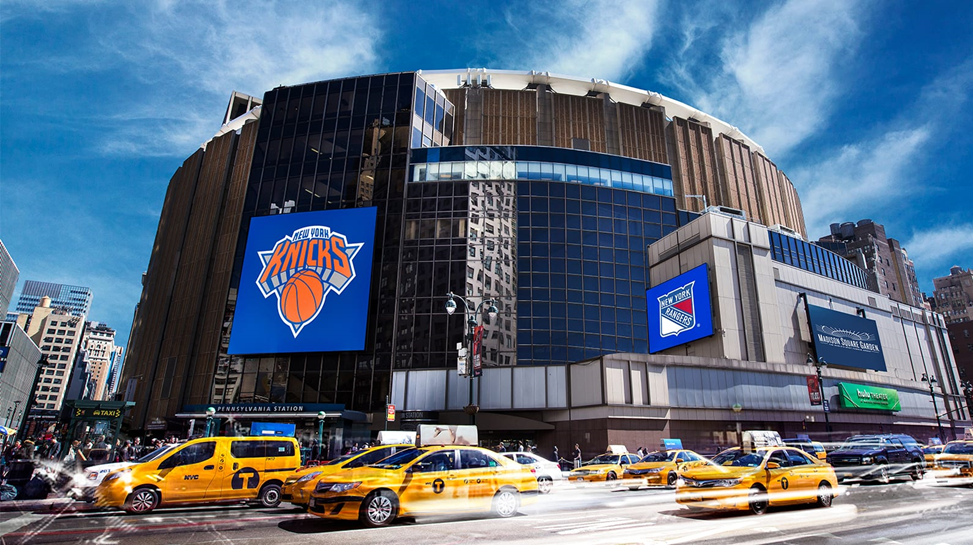
- Madison Square Garden[36]
- All guests are required to be respectful to those around them.
- Guests are to avoid blocking the view of others.
- Artists may request that guests be permitted to stand immediately in front of their seats during the entirety of the performance during some concerts. Standing guests should continue to be respectful of others around them and avoid blocking the view of other guests on these occasions.
- Guests shall not interfere with events or performers in any way.
- Foul/offensive language, fighting, obscene gestures and/or throwing objects is not permitted, nor is engaging in other behavior detrimental to the experience of other guests.
- It is not permitted for guests to stand on seats or any other building structure.
- It is not permitted for guests to block the aisles.
- It is not permitted for guests to occupy a seat or remain in an area for which they do not possess a valid ticket, and guests will be expected to provide their ticket upon request.
- It is not permitted for guests to smoke anywhere in Madison Square Garden facilities, as is required by the City of New York.
- Alcoholic beverages are to be consumed in a responsible manner.
- It is encouraged for guests to report inappropriate or offensive behavior to an Usher, Security Officer or Guest Experience Representative.
- Guests are required to comply with requests from arena staff regarding arena operational and emergency procedures.
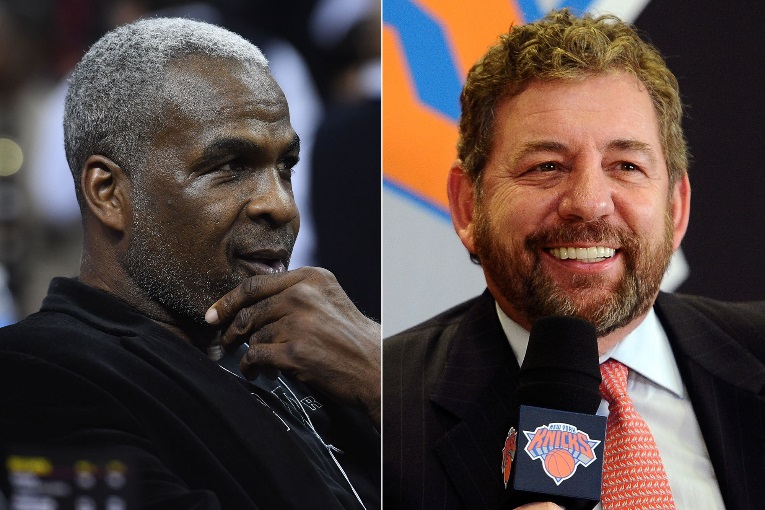
In March of 2019, James Dolan, owner of the New York Knicks, had a fan removed from Madison Square Garden for rude yelling.[37] “The Knicks released the following statement regarding the incident after the game: ‘Our policy is and will continue to be that if you are disrespectful to anyone in our venues, we will ask you not to return.’”[38] This was not the first time Dolan had fans ejected. “Dolan banned former Knicks star Charles Oakley from Madison Square Garden after the pair got into a verbal altercation during a 2017 game.”[39] Earlier in 2017, “a Knicks fan got the boot for yelling obscenities at team owner James Dolan.”[40] Dolan had verbal altercation outside of Madison Square Garden with the fan, “whom he admitted to calling an “a–h—.”[41]
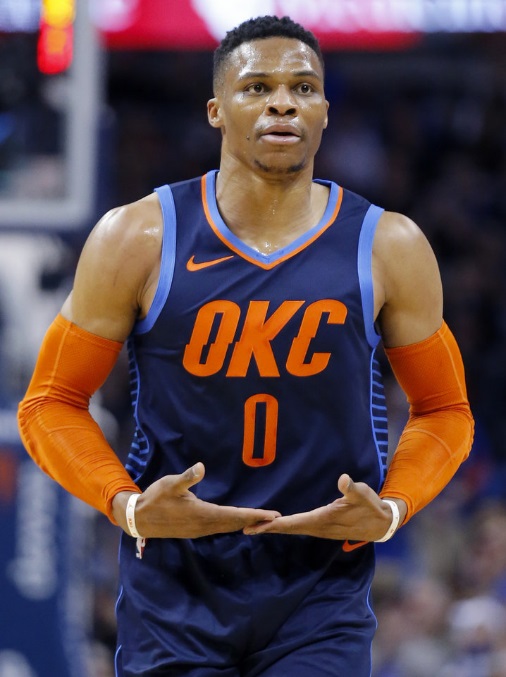 Other NBA teams have also reported the banning of fans. In March of 2019, the Boston Celtics banned a fan from the TD Garden through the following season “for directing a racial slur at Golden State Warriors’ center DeMarcus Cousins.”[42] This banning comes a few weeks after “Oklahoma City Thunder star Russell Westbrook and a fan of the Utah Jazz got into a verbal altercation after the fan used racial insults toward Westbrook. The Jazz banned the fan for life, while the NBA fined Westbrook $25,000 for the incident.”[43]
Other NBA teams have also reported the banning of fans. In March of 2019, the Boston Celtics banned a fan from the TD Garden through the following season “for directing a racial slur at Golden State Warriors’ center DeMarcus Cousins.”[42] This banning comes a few weeks after “Oklahoma City Thunder star Russell Westbrook and a fan of the Utah Jazz got into a verbal altercation after the fan used racial insults toward Westbrook. The Jazz banned the fan for life, while the NBA fined Westbrook $25,000 for the incident.”[43]
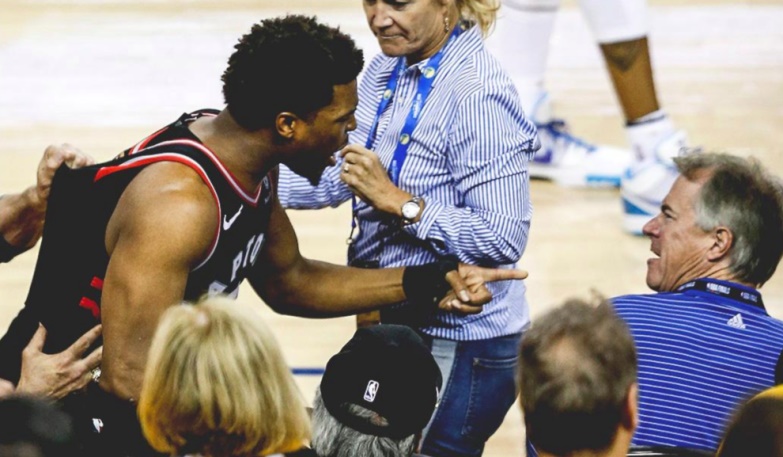 It seems that the NBA has no problems holding owners responsible. On June 7, 2019 it was reported that that Golden State Warriors investor and executive board member Mark Stevens (Stevens) “won’t be attending any games for a year and he’ll be writing a check for $500,000 to cover a fine announced by the team and the league.”[44] Further, “the NBA also announced it was banning Stevens from attending any team activities through the end of next season’s playoffs.”[45] This stems from an incident during Game 3 of the NBA finals wherein Toronto Raptors point guard Kyle Lowry (Lowry) was “going after a loose ball, jumped into the stands. Stevens, whom Lowry didn’t land on, shoved him. Lowry called for security, and Stevens was escorted out. The NBA said Stevens also directed obscene comments at Lowry [. . .].[46] In a statement the Golden State Warriors indicated that:
It seems that the NBA has no problems holding owners responsible. On June 7, 2019 it was reported that that Golden State Warriors investor and executive board member Mark Stevens (Stevens) “won’t be attending any games for a year and he’ll be writing a check for $500,000 to cover a fine announced by the team and the league.”[44] Further, “the NBA also announced it was banning Stevens from attending any team activities through the end of next season’s playoffs.”[45] This stems from an incident during Game 3 of the NBA finals wherein Toronto Raptors point guard Kyle Lowry (Lowry) was “going after a loose ball, jumped into the stands. Stevens, whom Lowry didn’t land on, shoved him. Lowry called for security, and Stevens was escorted out. The NBA said Stevens also directed obscene comments at Lowry [. . .].[46] In a statement the Golden State Warriors indicated that:
Mr. Stevens’ behavior last night did not reflect the high standards that we hope to exemplify as an organization. We’re extremely disappointed in his actions and, along with Mr. Stevens, offer our sincere apology to Kyle Lowry and the Toronto Raptors organization for this unfortunate misconduct. There is no place for such interaction between fans — or anyone — and players at an NBA game.[47]
NBA spokesman, Mike Bass, “said team representatives are held to the highest possible standard.”[48] “The conduct of Golden State Warriors investor Mark Stevens last night was beyond unacceptable and has no place in our league,” Bass said in a statement.[49]
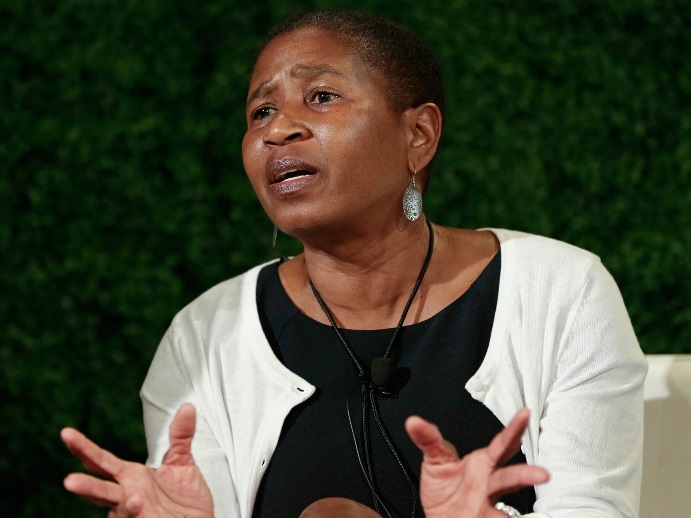 NBA Players Association’s Executive Director, Michele Roberts released a statement holding that: “The NBPA has previously expressed its support of a ‘zero-tolerance’ policy with respect to verbal and/or physical assaults perpetrated against players. Stevens’ status as a member of the ownership group does not alter that view.”[50]
NBA Players Association’s Executive Director, Michele Roberts released a statement holding that: “The NBPA has previously expressed its support of a ‘zero-tolerance’ policy with respect to verbal and/or physical assaults perpetrated against players. Stevens’ status as a member of the ownership group does not alter that view.”[50]
I take full responsibility for my actions last night at the NBA Finals and am embarrassed by what transpired, Stevens said. What I did was wrong and there is no excuse for it. Mr. Lowry deserves better, and I have reached out today in an attempt to directly apologize to him and other members of the Raptors and Warriors organizations. I’m grateful to those who accepted my calls. I hope that Mr. Lowry and others impacted by this lapse in judgment understand that the behavior I demonstrated last night does not reflect the person I am or have been throughout my life. I made a mistake and I’m truly sorry. I need to be better and look forward to making it right.[51]
Lowry said ‘there’s no room in our game’ for what Stevens did. In that situation, I don’t think I could have handled it any better. I’m glad I did what I did, and I understand that things could have been a lot different if I reacted a different way or if I did something or put my hands on him or did anything of that nature. But the support I’ve gotten from fellow players, the league, has been unbelievable. With that being said, I think more should be done. He’s not a good look for the ownership group that they have. And I know Joe Lacob. Those guys are great guys. The ownership that they have that I know, they’re unbelievable guys. But a guy like that, showing his true class, and he shouldn’t be a part of our league. There’s just no place for that.[52]
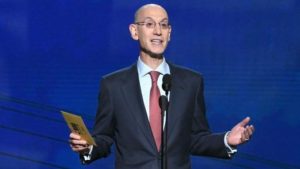
In a press conference a week prior to this incident, NBA Commissioner Adam Silver stated that
What I think we can do is refocus our efforts, as we have this year, on appropriate conduct for fans. And making sure that there’s a clear code of conduct that’s communicated to fans, that it’s consistently enforced in every NBA arena and that we’re creating a safe environment, of course for the players and all the other fans as well.
And as I said, we have redoubled our efforts. We have had lots of conversations directly with the Players Association, the players, because absolutely we want them to feel that they’re in a safe environment and we don’t want them to be distracted during the game or think that they have to take matters into their own hand.[53]
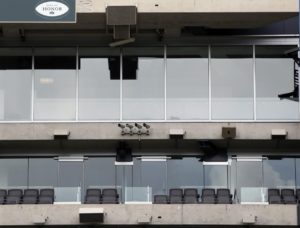
In 2014, the NFL, in addition to requiring a course on fan conduct be completed, instituted a universal ban on fans that are ejected from a stadium.[54] “‘Ejections are so small as a percent of fans; 8,000 fans [ejected] last year,’ said Ray DiNunzio, the NFL’s director of strategic security. ‘My guess is many are repeat ejections, so a universal ban will help.’”[55] The NFL equipped personnel with smart readers “so they could input information about the fans.”[56] “Through a centralized database, that information, perhaps including photos, will then be shared with other stadiums, DiNunzio said.”[57] Each week teams receive a list of fans that are banned from entering NFL stadiums.[58]
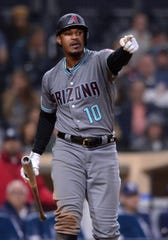 In April of 2019, “Diamondbacks outfielder Adam Jones had a fan ejected from Petco Park in San Diego [. . .]. Jones said that the fan was ‘cussing me out’ as Jones fielded a fly ball.”[59]
In April of 2019, “Diamondbacks outfielder Adam Jones had a fan ejected from Petco Park in San Diego [. . .]. Jones said that the fan was ‘cussing me out’ as Jones fielded a fly ball.”[59]
 In April of 2019, a Dallas Stars fan was ejected from the American Airlines Center after an altercation with Nashville Predators forward Austin Watson, who was in the penalty box.[60] The Dallas Stars issued a statement after the NHL Playoff game stating that: “[t]he fan sitting directly next to the penalty box was reaching inside the penalty box and making inappropriate comments. Due to this behavior, it was deemed necessary to eject the fan. Player and fan safety is the first consideration in any incident.”[61]
In April of 2019, a Dallas Stars fan was ejected from the American Airlines Center after an altercation with Nashville Predators forward Austin Watson, who was in the penalty box.[60] The Dallas Stars issued a statement after the NHL Playoff game stating that: “[t]he fan sitting directly next to the penalty box was reaching inside the penalty box and making inappropriate comments. Due to this behavior, it was deemed necessary to eject the fan. Player and fan safety is the first consideration in any incident.”[61]
 In June of 2018, youth sporting events joined other sports in working to curtail inappropriate fan behavior.[62] “The Fort Collins-based company that produces sporting events around the country recently more strictly enforced its policy for ejecting fans exhibiting unruly behavior as a way to combat an umpire shortage and improve the experience of well-behaved fans, players and coaches.”[63]
In June of 2018, youth sporting events joined other sports in working to curtail inappropriate fan behavior.[62] “The Fort Collins-based company that produces sporting events around the country recently more strictly enforced its policy for ejecting fans exhibiting unruly behavior as a way to combat an umpire shortage and improve the experience of well-behaved fans, players and coaches.”[63]
“For some reason, a small percentage of fans forget their decency when they attend sporting events and think they can yell at officials for an hour or two or all day and we have decided that as a company we don’t have room for that,’’ Triple Crown CEO Keri King said. “Our company has a value system of respecting all and we believe this better delivers that message to our customers. If fans don’t, they will be ejected.’’[64]
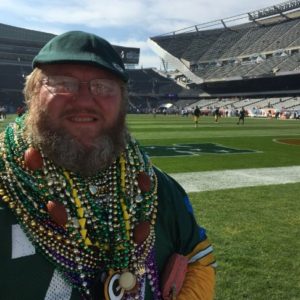 Included in their memorandum was a list of what they consider bad behavior: verbal or physical abuse, foul or profane language, and relentless questioning and ridicule of the official.[65] Demonstrating bad behavior, and the coaches’ inability to quash such behavior, could result in the following: ejecting of parents, coaches, and possibly the athlete when the parents demonstrate bad behavior; forfeiting the game if the coach cannot elicit good behavior from parents; removing coaches or parents for the entire event.[66]
Included in their memorandum was a list of what they consider bad behavior: verbal or physical abuse, foul or profane language, and relentless questioning and ridicule of the official.[65] Demonstrating bad behavior, and the coaches’ inability to quash such behavior, could result in the following: ejecting of parents, coaches, and possibly the athlete when the parents demonstrate bad behavior; forfeiting the game if the coach cannot elicit good behavior from parents; removing coaches or parents for the entire event.[66]
In 2018, Russell Beckman, who has held season tickets for the Green Bay Packers since the 1980’s and Chicago Bears season ticket since 2003, sued the Chicago Bears in Chicago’s U.S. District Court for the Bears actions in refusing Beckman’s participation with other season ticket holders in an event before a game in 2016 because he was wearing Packers gear.[67]
Beckman has attended many games at Soldier Field and, indeed, was allowed on the apron before other games. But during the Packers-Bears game on Dec. 18, 2016, he was denied access. There were other Packers fans at field level, although they were guests of the Packers or involved in other programs. The Bears did make it clear beforehand that opposing team gear would not be permitted as part of the program.[68]
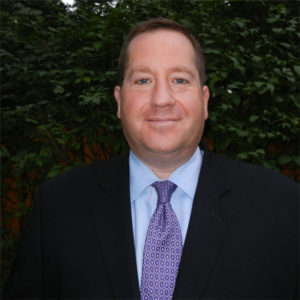 In 2017, Beckman tested the waters and wore a Falcon’s jersey to an on field event wherein no one removed him from participation.[69] As of April of 2018, Beckman was representing himself and would happily settle for an agreement that allows him on the field wearing Packers gear and gets his court costs paid.[70] By November of 2018, Beckman was being represented by The First Amendment Clinic at Duke Law and Attorney Michael Lieber of the Lieber Law Group.[71] Beckman had the first big test of his argument that the Bears’ lease Solider Field from a public entity and that the Bears are a state actor, thereby making Soldier Field events a public and not a private affair. In December of 2018, “Judge Joan Gottschall denied Beckman’s motion for preliminary injunction and a temporary restraining order that would have allowed him to wear his Packers gear on the field before Chicago Bears’ games at Soldier Field.[72] In a statement, Beckman’s lawyer said:
In 2017, Beckman tested the waters and wore a Falcon’s jersey to an on field event wherein no one removed him from participation.[69] As of April of 2018, Beckman was representing himself and would happily settle for an agreement that allows him on the field wearing Packers gear and gets his court costs paid.[70] By November of 2018, Beckman was being represented by The First Amendment Clinic at Duke Law and Attorney Michael Lieber of the Lieber Law Group.[71] Beckman had the first big test of his argument that the Bears’ lease Solider Field from a public entity and that the Bears are a state actor, thereby making Soldier Field events a public and not a private affair. In December of 2018, “Judge Joan Gottschall denied Beckman’s motion for preliminary injunction and a temporary restraining order that would have allowed him to wear his Packers gear on the field before Chicago Bears’ games at Soldier Field.[72] In a statement, Beckman’s lawyer said:
The Judge today said the parties’ arguments to the Court were essentially a tie ball. But a tie ball goes to the home team at this juncture. This case is in its early stages. As we proceed through discovery, we expect that the facts will show that the Bears are so entwined with a public entity—the Chicago Park District—that the Bears must uphold all Soldier Field patrons’ First Amendment rights. And that includes fans of opposing teams.[73]
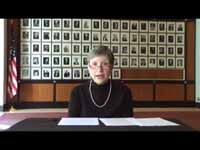 In 2012, the NFL decided it was time to get serious about the conduct of fans attending their games.[74] NFL teams began requiring that “any fan who gets ejected from a stadium to take a four-hour online course before they are permitted to come back into the facility again.”[75] The online course “focuses on alcohol abuse, anger management and crude behavior,” and was designed by a psychotherapist in concert with the MetLife Stadium security director. [76] “The program is an extension of the NFL Fan Code of Conduct that the league implemented in 2008 to better control unruly fans by threatening to revoke ticket privileges for future games.”[77] The course is not free to fans with teams setting their own prices.[78]
In 2012, the NFL decided it was time to get serious about the conduct of fans attending their games.[74] NFL teams began requiring that “any fan who gets ejected from a stadium to take a four-hour online course before they are permitted to come back into the facility again.”[75] The online course “focuses on alcohol abuse, anger management and crude behavior,” and was designed by a psychotherapist in concert with the MetLife Stadium security director. [76] “The program is an extension of the NFL Fan Code of Conduct that the league implemented in 2008 to better control unruly fans by threatening to revoke ticket privileges for future games.”[77] The course is not free to fans with teams setting their own prices.[78]
Currently Lambeau Field and the Green Bay Packers offer a Fan Conduct Class for $250.00.[79] This class “is required of all guests who have been asked to leave the field for violations of [Lambeau Field’s] ‘Code of Conduct and/or Alcohol Policy.’”[80] “In short, the purpose of this online class is to educate [Lambeau Field] guests about the risks of alcohol use, abuse, dependence, and addiction as well as better understanding of the Code of Conduct at Laumbeau Field.”[81] The class, which is four hours long, covers the following topics:
- Introduction, purpose and benefits of Fan Conduct Class
- Stadium “Code of Conduct” (Failing to follow instruction of stadium personnel)
- Alcohol abuse and public intoxication (Intoxication or other signs of alcohol or substance impairment that results in irresponsible behavior)
- What is disruptive fan behavior? (Behavior that is unruly, disruptive, or illegal in nature)
- Gaining control of ourselves (Interference with the progress of the game, including throwing objects onto the field)
- Skills in improving empathy towards other fans
- Skills for becoming less impulsive and improving judgment
- Skills for better managing stress and learning new ways of staying in control during the game day experience
- Communication skills as prevention (Foul or abusive language or obscene gesture)
- Verbal or physical harassment of opposing team fans
- Smoking policies
- Review of stadium code of conduct and course skills[82]
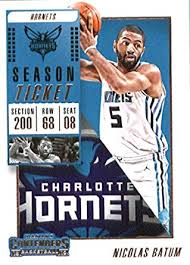
III. The Season Ticket
Making a determination about the property rights of season ticket holders seems to always begin and end at the “Terms and Conditions” section of the Agreement between the fan and the organization.[83] At the close of every season, season ticket holders seem to almost always have the option to renew their contract for the upcoming season, which tends to lead to many fans believing that they hold a property right in their seat; this is where courts sometimes differ from one to another.[84]
For example, in In re I.D. Craig Service Corp., a case concerning season tickets held by a Pittsburgh Steelers fan, the court held that where there is a reasonable expectation of renewal and where renewal is automatically performed, the fan holds a property right.[85] The source of the dispute in Craig began when a bankruptcy trustee attempted to sell a bankruptcy debtor’s status as a Pittsburgh Steelers (Steelers) season ticket holder to six different buyers before the start of the 1990 NFL season.[86] The Steelers, in contesting this action, took a stance that the sale should not be permitted because it violates Pennsylvania anti-scalping laws, the trustee is not permitted to sell renewal rights of the executory contract the debtor was bound to, and that the number of transfers on a season ticket holder account is limited to one.[87] Through the course of the proceedings the court discovered that renewal was regularly offered on a year-to-year basis; the court determined that this created an expectancy interest, rather than a contractual interest.[88] Due to this expectancy interest, the court further found that this type of interest establishes “property,” something that the trustee is reasonably allowed to sell.[89]
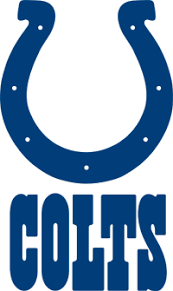 On the contrary, in Frager v. Indianapolis Colts, Inc., a 2016 case against the Indianapolis Colts (Colts), the court held that season ticket holders have “speculation on a chance, not a legal right” to renewal of season tickets, thus, a property right is not created.[90] This case against the Colts stems from an action by the organization when they refused to renew Frager’s season tickets for the 2016 NFL season.[91] Frager, a season ticket holder who regularly held 94 season tickets to Colts games, argued that the refusal of renewal constituted a conversion of property “that rightfully belongs to him.”[92] As the court pointed out, for Frager to state a valid claim for conversion, it must be shown that he has “an immediate, unqualified right to possession resting on a superior claim of title” and further establish that “appropriation of personal property by another for that party’s own use and benefit in exclusion and defiance of the owner’s rights.”[93] Frager attempted to rely upon the ruling in Craig, but it was established by the Court that the same scenario was not in the present case; Frager did not hold a reasonable expectation to renew his season tickets and, through the language of the agreement with the Colts, the organization retains the right to reject renewal.[94] The opinion by the Honorable William T. Lawrence of the Indiana Southern District Court in Frager reads as follows:
On the contrary, in Frager v. Indianapolis Colts, Inc., a 2016 case against the Indianapolis Colts (Colts), the court held that season ticket holders have “speculation on a chance, not a legal right” to renewal of season tickets, thus, a property right is not created.[90] This case against the Colts stems from an action by the organization when they refused to renew Frager’s season tickets for the 2016 NFL season.[91] Frager, a season ticket holder who regularly held 94 season tickets to Colts games, argued that the refusal of renewal constituted a conversion of property “that rightfully belongs to him.”[92] As the court pointed out, for Frager to state a valid claim for conversion, it must be shown that he has “an immediate, unqualified right to possession resting on a superior claim of title” and further establish that “appropriation of personal property by another for that party’s own use and benefit in exclusion and defiance of the owner’s rights.”[93] Frager attempted to rely upon the ruling in Craig, but it was established by the Court that the same scenario was not in the present case; Frager did not hold a reasonable expectation to renew his season tickets and, through the language of the agreement with the Colts, the organization retains the right to reject renewal.[94] The opinion by the Honorable William T. Lawrence of the Indiana Southern District Court in Frager reads as follows:
While a season ticket holder may be permitted to transfer any rights he may have, those rights are created by the contract. The Colts simply are not contractually obligated to renew a season ticket holder’s account each year. The back of the invoice expressly curtails renewal rights. The intent of the Colts is clear from this language. As such, the Plaintiff did not have an ownership interest in season tickets for future seasons—including the 2016 season—and thus he fails to state a valid claim for conversion.[95]
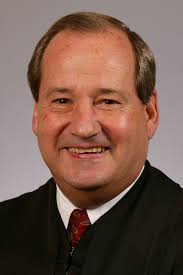 There have been differing opinions by courts, and therefore it should become a uniform standard that organizations construct language against renewals creating a property right.[96] Various organizations across professional sports, and even some universities, have chosen to abide by this stance, making it clear to their season ticket holders that having the privilege to renew their season tickets is solely granted by the organization, or university, and does in no way create a property right.[97] Many organizations have even gone as far as ensuring that it is clearly stated within the season ticket agreement that the agreement itself is a revocable license.[98] This language creates an understanding between the organizations and the season ticket holders how far their tickets and rights as fans truly go.[99]
There have been differing opinions by courts, and therefore it should become a uniform standard that organizations construct language against renewals creating a property right.[96] Various organizations across professional sports, and even some universities, have chosen to abide by this stance, making it clear to their season ticket holders that having the privilege to renew their season tickets is solely granted by the organization, or university, and does in no way create a property right.[97] Many organizations have even gone as far as ensuring that it is clearly stated within the season ticket agreement that the agreement itself is a revocable license.[98] This language creates an understanding between the organizations and the season ticket holders how far their tickets and rights as fans truly go.[99]
Here are just a few examples of the language by organizations in regard to the privilege to renew, revocation of rights, and simply the overall scope of the license that is being conferred:
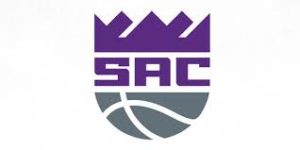 Sacramento Kings:
Sacramento Kings:
“The opportunity to renew a season ticket membership for the next season is not guaranteed and is revocable at any time at the sole discretion of the Sacramento Kings.”[100]
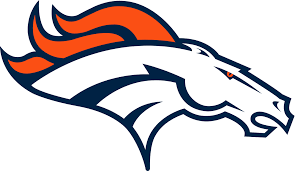 Denver Broncos:
Denver Broncos:
[T]he opportunity to purchase season ticket accounts from year-to-year, at any seat location, is a privilege granted by the Broncos, which may be revoked by the Broncos at any time. Neither a Season Ticket Account, nor the opportunity to purchase a Season Ticket Account from year-to-year, constitutes any form of legal or equitable right, including without limitation an express or implied contract, lease, option, right of first refusal, implied trust, or expectancy interest. . . . The privilege to purchase a Season Ticket Account from year-to-year is not ‘property’ and creates no property rights whatsoever under state statutory or common law or under the United States Bankruptcy Code.[101]
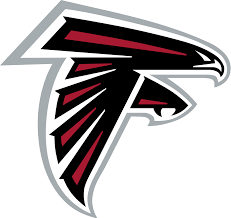 Atlanta Falcons:
Atlanta Falcons:
Your Season Ticket Account is a renewable, revocable license and may be withdrawn at any time at the sole discretion of the Atlanta Falcons.[102]
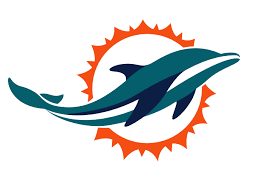 Miami Dolphins:
Miami Dolphins:
[T]he opportunity to license a Membership from year-to-year, at any seat location, is a privilege granted by the Dolphins, which may be revoked at any time [. . .]. Members should not form any matter of reliance on the privilege to license a Membership or Miami Dolphins tickets from year-to-year, nor can there be any prescriptive right to license a Membership annually. The privilege to license a Membership and Miami Dolphins tickets from year-to-year is not ‘property’ and creates no property rights whatsoever under state statutory or common law or under the United States Bankruptcy Code.[103]
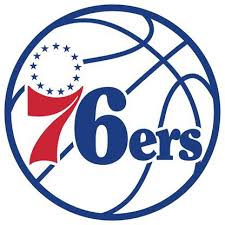 Philadelphia 76ers:
Philadelphia 76ers:
Each ticket represents a separate, limited and revocable license that only permits the bearer the right to attend the 76ers home game identified on such Ticket and sit in the seat location identified on such Ticket. No property rights, and no renewal or expectancy rights, are conveyed under this Membership License.[104]
 University of Arizona:
University of Arizona:
The opportunity to purchase or renew season tickets and priority seating is not a property right, but rather a license that may be revoked by ICA at any time. At the discretion of ICA, renewal is generally offered to season ticket holders and priority seating holders for the same seating that was held the previous year.[105]
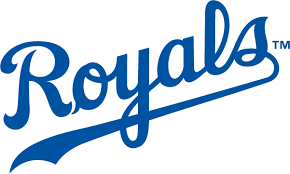 Kansas City Royals:
Kansas City Royals:
The Kansas City Royals reserve the right to change, add to or discontinue any of its policies, procedures, benefits or privileges, including the renewal of season seats at any time by notifying the Season Ticket Member of Record at the mailing or electronic mail address of record. The Royals reserve the right to cancel a Season Ticket Account or withhold an offer of Season Ticket renewal for any reason [. . .].[106]
- Phoenix Suns:
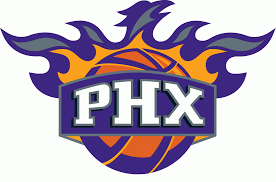
The opportunity to renew season tickets is a privilege granted by the Suns and may be withdrawn in the Suns’ discretion.[107]
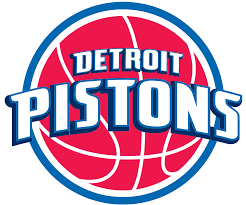 Detroit Pistons:
Detroit Pistons:
No property rights, and no renewal or expectancy rights, are conveyed under this Agreement. This Agreement and any or all of the Tickets and other Membership Privileges are revocable at any time by the Pistons and/or PSE, in their sole and absolute discretion, with cause or without cause.[108]
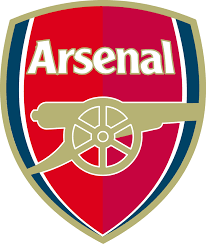 Arsenal:
Arsenal:
The Season Ticket remains the property of the Club at all times. These Terms and Conditions are valid for the Season only and accordingly, unless terminated earlier in accordance with these Terms and Conditions, will terminate at the end of the Season.[109]
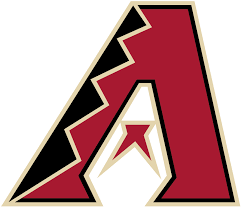 Arizona Diamondbacks:
Arizona Diamondbacks:
Holder acknowledges and agrees that Holder’s account is enrolled in ‘Easy Pay’, which permits Club to automatically renew Holder’s tickets on an annual basis. Holder hereby authorizes Club to automatically renew this Agreement for the following season.[110]
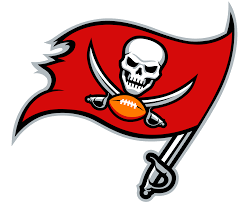 Tampa Bay Buccaneers:
Tampa Bay Buccaneers:
We reserve the right to revoke a season pass at any time without cause, in which case your exclusive remedy would be a refund of any amounts paid for which no corresponding benefits have been provided, which is determined in our sole discretion.[111]
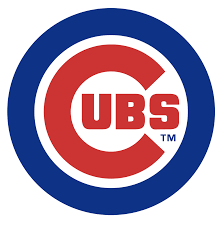 Chicago Cubs:
Chicago Cubs:
The Club reserves the right, with or without refunding the face value of the Ticket, to revoke the License, refuse admission or eject any person whose conduct is deemed to disorderly, who uses abusive language, who carries a weapon into Wrigley Field, who fails to comply with the terms and conditions of the License, who interferes with any ball in the field of play or any player attempting to make a play on any batted, pitched or thrown baseball, or who otherwise violates the Guest Code of Conduct published at www.cubs.com and applicable to the Ballpark.[112]
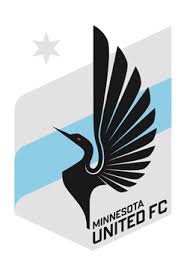 Minnesota United FC:
Minnesota United FC:
Minnesota United FC, in its sole and absolute discretion, may revoke this license at any time for any reason, with or without provided a refund.[113]
The purpose behind the wording within these terms and conditions sections has many other purposes beyond simply restricting property rights; many of these terms serve a function that allows for the organizations to maintain the upper-hand financially.[114] For example, the Cleveland Cavaliers (NBA) require “all of their season ticket holders to agree to an automatic renewal policy,” eliminating the stress put on the organization of reaching out to each individual season ticket holder at the conclusion of each season.[115] Minnesota United FC (MLS) has a similar term in their season ticket policy, requiring that all season ticket holders enter into an automatic renewal upon the initial purchase of season tickets.[116] Further, organizations like the Chicago Cubs (MLB) have constructed clauses which call for season tickets to be “renewed on a year-to-year basis, at the discretion of the team,” meaning that it is up to the organization to determine if the fan is worthy of receiving another year of “season ticket holder privileges.”[117]
In most instances the organizations hold all of the power in making the determination regarding the renewal or revocation of a season-ticket package. Some organizations impose language on the revocable license itself or the season-ticket agreement that simply states that all decisions are at the organization’s discretion, but there have been specific scenarios displaying when situations have surpassed the “for cause” threshold, leading to the organization withholding the renewal privilege or immediately revoking the season tickets.
Here are a few examples from different sports organizations showing why renewal was not or will not be offered or why revocation occurred:
- If a fan violates the team’s prescribed rules of conduct.[118]
- The organization believed that the season ticket holder was scalping some of his tickets, so during the renewal period they only allowed the season ticket holder to purchase half of the amount of season tickets to stop the scalping.[119]
- The organization at times may make a determination to revoke access to certain privileges that come along with being a season ticket holder if they deem it to be in the organization’s best interest or if there is a general policy in place.[120]
- When deciding whether to revoke renewal privileges, the Sacramento Kings will consider the season ticket member’s violation of rules, regulations and policies of the Sacramento Kings and the NBA, including without limitation violations of abusive spectator behavior and/or ticket scalping rules then in effect.[121]
- The [NFL’s] Denver Broncos reserve the right to revoke any season ticket or Season Ticket Account with cause or without refund, because of, without limitation, violation of any of the policies of the Denver Broncos, misconduct, [or] ticket ownership disputes involving the Broncos.[122]
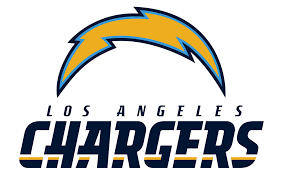 The [NFL’s Los Angeles] Chargers retain the right to revoke or cancel a Season Ticket Account without refund for reasons including but not limited to: failure to meet payment deadlines, drunkenness, disorderly behavior, habitual misconduct, fraudulent activity, scalping or improper resale of tickets . . . .[123]
The [NFL’s Los Angeles] Chargers retain the right to revoke or cancel a Season Ticket Account without refund for reasons including but not limited to: failure to meet payment deadlines, drunkenness, disorderly behavior, habitual misconduct, fraudulent activity, scalping or improper resale of tickets . . . .[123]- The [Premier League’s Arsenal F.C.] Season Ticket may be cancelled in whole or in part by the Club at any [time] without providing any reason. A proportionate refund will be given to you, in the absolute discretion of the Club and/or in accordance with the Terms and Conditions of Entry, in the event of any such cancellation.[124]
These few examples illustrate the fact that the organizations “hold all the chips” when it comes to decisions on non-renewal and revocation. These decisions can be backed by specific reasons, such as a way to prevent ticket scalping or violation of the fan conduct policy, or simply because the team has the discretion to do so. These agreements set forth by the organizations, while blatantly speaking about renewal and revocation, also consistently mention ticket resale and transfer limitations for the season ticket holders, the fact that one’s seats may be relocated at any time, and the overall assumption of the risk held. The agreements reiterate the language found on the reverse side of the ticket. When holding all the power, and the fans agreeing to provide the organizations with this power upon purchase, the fans subject themselves to the will of the organizations. It is important to remember that, generically speaking, the rights of season ticket holders are governed by the law (applicable ordinances, state law, etc.), the language on the reverse-side of their ticket, language found on an individual’s parking pass, the technical language within the season ticket agreement, and the fan code of conduct, with consideration to whether the facility and surrounding area is public or private.[125]
Season Ticket Holder Agreements will contain other terms, rights, responsibilities, obligations, and provisions as between the team and the ticket holder, including, but not limited to:
- Payment Plan
- Automatic Ticket Renewal
- Revocable license
- Playoff Tickets
- Account Ownership
- Season Ticket Transfer Prohibited
- Season Ticket Relocation
- Ticket Resale Restricted
- Fan Behavior
- Lost or Stolen Tickets
- Release of Liability
- Indemnification
- Limited Transfer Policy – Bankruptcy
- Fan Code of Conduct
- Renewal
- Revocation of Season Ticket Accounts – Disputes
- Assumption of Risks – Arbitration
- No Assignment or Transfer
- No Transcription of Games
- Scope of License[126]
- Personal Seat Licenses and The Rams
To the layperson, it can be somewhat easy to interchangeably use the phrases “season tickets” and “personal seat licenses,” but there are some distinct differences between the two. A personal seat license, or PSL, establishes that the holder has the rights to a particular seat within a venue.[127] A PSL may further provide the holder with the right to buy season tickets in a desired location in the future, the right of first refusal for tickets to post-season games, a right to transfer the license, and in some cases the PSL is held for an indefinite term or for a seat number of years; all of these things establish that a PSL holder has more rights of control than a season ticket holder.[128] Many organizations have turned to using PSL’s because it creates a guaranteed stream of revenue, being that the licensee essentially establishes that they will be purchasing tickets for multiple years.[129]
With most of these PSL agreements, the team chooses to construct it as a contract, including various disclaimers and limited interests that are held.[130] Within the terms and conditions of the PSL agreement, the organization looks to maintain a stranglehold on the renewal and transfer rights, as well as establish that the organization holds a right of revocation.[131]
Provided here are some examples of PSL terms and conditions, showing the efforts by organizations to limit a PSL holder’s interest:
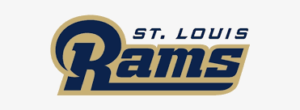 Louis Rams:
Louis Rams:
The rights licensed under this Agreement are rights of personal privilege and do not under any circumstance confer upon [the PSL holder] and interest or estate in real property [. . .]. For one year following the purchase of the [PSL], [the holder] shall not sell, pledge, hypothecate or transfer [. . .]. [T]he Team hereby reserves [. . .] [t]he right to terminate this Agreement and refund part or all of [the PSL holder’s] deposit [. . .] for any [. . .] reason satisfactory for [. . .] the Team in its sole discretion.[132]
 New York Giants:
New York Giants:
If [the PSL holder] does not purchase Season Tickets [. . .] by the date specified each year by the Giants in its sole discretion, then [the PSL holder’s] rights to purchase Season Tickets hereunder will terminate automatically [. . .]. PSLs do not grant or provide [the PSL holder] with any property right [. . .] and does not confer upon the [PSL holder] any interest in real property or any leasehold interest in Stadium seats.[133]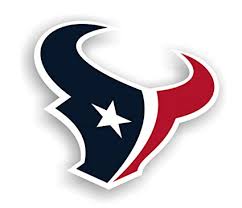
- Houston Texans:
If [the PSL holder] does not purchase season tickets [. . .] by a specified deadline [. . .] then [the PSL holder’s] rights and obligation to purchase season tickets hereunder will terminate automatically [. . .]. A PSL may not be transferred prior to May 31, 2003, [. . .] without the approval of the [Texans].[134]
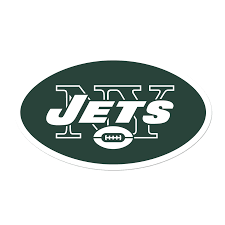 New York Jets:
New York Jets:
Licensee (i) shall have the right and the obligation to purchase admission tickets for the [s]eats for all pre-season and regular season home games [. . .] and (ii) shall have the right, but not the obligation, to purchase admission tickets for the [s]eats for all post-season home games [. . .]. If Licensee fails to purchase such tickets for any post-season [. . .] [g]ame [. . .] then Licensor and the Jets shall be free to sell such tickets to others in their sole discretion [. . .]. [Further,] PSLs do not grant or provide Licensee with any ownership, voting or other equity interest [. . .]. The PSL is a right of personal privilege revocable in accordance with the terms of this PSL Agreement [. . .].[135]
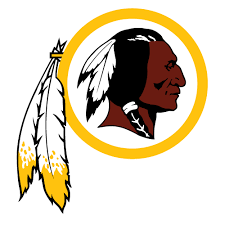 Washington Redskins:
Washington Redskins:
The agreement provides Licensee with only a limited license to use and obtain access to the Stadium and the Club Seat(s) in accordance with the agreement. The agreement does not confer upon Licensee any right, title, estate or interest in the Club Seat(s), seat location, or right of renewal. WFI specifically reserves the right, to be exercised according to its sole and absolute discretion, to use and permit others access to the Stadium and to permit others to use the Club Seat(s) to the extent not otherwise conveyed to Licensee in the agreement, and to refuse to renew the License for any reason.[136]
When discussing PSLs, a question seems to always arise: does this agreement establish a property right for the fan? When assessing this, it must first be established that the term “property” is regularly understood to “consist[] of a collection of individual rights, including not only the right to possess and own the object, but also the rights to use, enjoy, and dispose of the object.”[137] However, being that a PSL is a license granted to the fan by the organization, it must be remembered that “a license is a restricted interest in an object or land.”[138] When addressing this question of a property right, courts have established that a PSL is “personal property that is vested in the owner and that is alienable by the terms of the [organization’s] document that creates the right in the property owner.”[139] Further, when showing that a PSL holder’s interest is stronger than that of a season ticket holder, courts have stated that “a PSL does not merely constitute a license to purchase season tickets to the sporting event, but it also provides “a valuable expectancy interest in renewable rights to season tickets [. . .] a wholly separate and distinct interest from game tickets.”[140] Addressing the property rights of PSL holders requires us to also consider the fact that the PSL agreement provides the holder with exclusive access to a particular seat during a sporting event at the specified stadium.[141] While PSL holders are still subject to revocation based upon failure to purchase tickets for each season,[142] they still maintain an ability to transfer, a right more commonly “associated with complete property ownership.”[143]
While many organizations claim that PSL holders do not have a property/ownership interest in their seat, here are a few examples which seem to contradict that stance: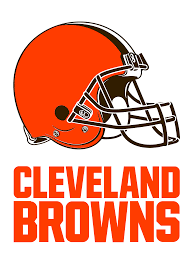
- A challenge against the Cleveland Browns found that a debtor’s transfer of their PSL to a creditor was within the bounds of the agreement because the PSL was the property of the debtor and could be transferred at their discretion.[144]
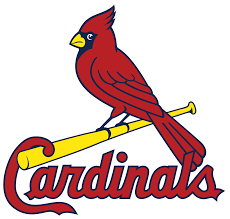 The St. Louis Cardinals advertised that their PSL program, known as the Ballpark Founders programs, provides the PSL holder “the right to maintain and control, for as long as [the holder chooses], seats that offer the closest proximity to the field and the best views of the game . . . .”[145]
The St. Louis Cardinals advertised that their PSL program, known as the Ballpark Founders programs, provides the PSL holder “the right to maintain and control, for as long as [the holder chooses], seats that offer the closest proximity to the field and the best views of the game . . . .”[145]
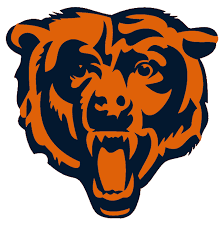
- The Chicago Bears pledged in a marketing scheme that a PSL “will cement your affiliation and personal connection to the Chicago Bears—it is your one chance to become a permanent part of the Bears’ future. Your PSL . . . gives you permanent control of the rights to your new seats.”[146]
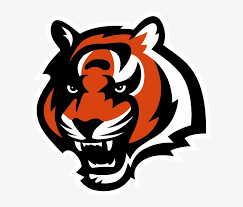 The Cincinnati Bengals marketed their version of PSLs, known as the Charter Ownership Agreement (COA), by saying the “COA’s transfer the ownership rights of the season ticket locations from the team to the individual entering into the ownership Once the COA is paid in full, the owner is granted control of the season tickets.”[147]
The Cincinnati Bengals marketed their version of PSLs, known as the Charter Ownership Agreement (COA), by saying the “COA’s transfer the ownership rights of the season ticket locations from the team to the individual entering into the ownership Once the COA is paid in full, the owner is granted control of the season tickets.”[147]
With the general premise of the PSL now being understood, we now turn to one of the most pressing legal battles that any professional sports organization has faced following a change in host city: The Los Angeles Rams v. Envision.[148] The frustration of the Rams faithful in St. Louis stems from January 12, 2016; the day that the Rams’ move to Los Angeles became official.[149] Most of these faithful fans were owners of a PSL at The Dome at America’s Center, the Rams’ former home in St. Louis, which are now essentially useless with the Rams’ now settling out west.[150] Being that the fans in St. Louis signed the PSL agreement with the belief that it would remain in effect until 2025 no matter where the Rams played, they felt the licenses should remain valid even with the Rams now settled into their new home in Los Angeles.[151] Eventually, these feelings boiled over into full-on frustration, leading to three class action lawsuits hoping to force the Rams to reimburse anyone who bought a PSL that will no longer be honored due to the move to Los Angeles.[152] In the summer of 2017, three class action lawsuits against the Rams regarding this issue were consolidated, with two of the plaintiffs, Envision and Arnold, arguing that the PSL holders in St. Louis should be granted access to tickets in Los Angeles due to the terms of the PSL agreement, and the third plaintiff, McAllister, argued that the PSL agreements were terminated and the Rams were in breach.[153] Regardless of the arguments being made, through discussions with plaintiffs to the suit, the goals of the lawsuit were very apparent: to obtain recovery for the loss of ticket usage due to the abandonment by the Rams.[154]
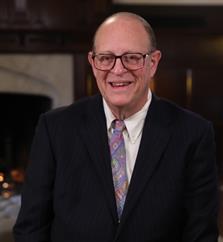
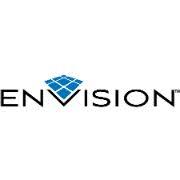
This stance was clearly stated during a conversation with Steve Lowy (Lowy), who, amongst other accolades, is the Chairman of Envision, LLC, a technologically-focused staffing agency with offices spanning three states.[155] As a PSL holder directly affected by the Rams’ move from St. Louis to Los Angeles, Lowy came together with other PSL holders to establish the Envision Class and to bring suit against the Rams organization.[156] Lowy and the Envision Class were directly motivated by their feelings of betrayal stemming from the fact that they had “paid for PSLs and then [the team] left without notice” and they felt that it was proper for the Class to “get some of [their] money back.”[157]
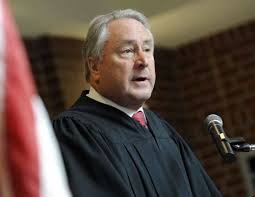 On the Envision and Arnold portion of the lawsuit there is an interesting dilemma, where there are two different agreements, namely the FANS Agreement and the Rams Agreement that are in question as to whether access to tickets in Los Angeles should be granted.[158] Judge Stephen N. Limbaugh of the United States District Court for the Eastern District of Missouri assessed the two agreements separately to determine what would be the appropriate action.[159] Judge Limbaugh discovered that within the FANS Agreement, there was conflicting language; some of which stated that the “[Rams] will use its best efforts to assure [PSL holders] the right to purchase . . . tickets for seats” in a stadium where games may be transferred to, and other language stating that this agreement is valid for 30 years as long as the Rams play football at the stadium in St. Louis and the PSL holder agrees not to sue if the Rams do not play their home games in St. Louis.[160] Being that this type of agreement is a contract, Judge Limbaugh determined the intention of the PSL holders and the Rams, alike, through the plain and ordinary meanings of the provisions.[161] Envision and Arnold relied heavily upon the provision regarding “Best Efforts” being made, while the Rams harped on the section that stated that the validity of the agreement relies wholeheartedly upon whether the Rams play at the stadium in St. Louis.[162] Judge Limbaugh stated that the Rams’ stance was more favorable, and went as far as saying that the provision relied upon “appears to trump all other provisions” in the PSL agreement.[163] In supporting his stance in regard to the FANS Agreement, Judge Limbaugh stated that “[b]ecause NFL Football is no longer played at the [stadium in St. Louis] by the Rams, the contract has terminated just as it would have if the contract had run its full 30-year course.”[164] Due to the powerful language implanted into the FANS Agreement, the court issued judgment on the pleadings for the Rams.[165]
On the Envision and Arnold portion of the lawsuit there is an interesting dilemma, where there are two different agreements, namely the FANS Agreement and the Rams Agreement that are in question as to whether access to tickets in Los Angeles should be granted.[158] Judge Stephen N. Limbaugh of the United States District Court for the Eastern District of Missouri assessed the two agreements separately to determine what would be the appropriate action.[159] Judge Limbaugh discovered that within the FANS Agreement, there was conflicting language; some of which stated that the “[Rams] will use its best efforts to assure [PSL holders] the right to purchase . . . tickets for seats” in a stadium where games may be transferred to, and other language stating that this agreement is valid for 30 years as long as the Rams play football at the stadium in St. Louis and the PSL holder agrees not to sue if the Rams do not play their home games in St. Louis.[160] Being that this type of agreement is a contract, Judge Limbaugh determined the intention of the PSL holders and the Rams, alike, through the plain and ordinary meanings of the provisions.[161] Envision and Arnold relied heavily upon the provision regarding “Best Efforts” being made, while the Rams harped on the section that stated that the validity of the agreement relies wholeheartedly upon whether the Rams play at the stadium in St. Louis.[162] Judge Limbaugh stated that the Rams’ stance was more favorable, and went as far as saying that the provision relied upon “appears to trump all other provisions” in the PSL agreement.[163] In supporting his stance in regard to the FANS Agreement, Judge Limbaugh stated that “[b]ecause NFL Football is no longer played at the [stadium in St. Louis] by the Rams, the contract has terminated just as it would have if the contract had run its full 30-year course.”[164] Due to the powerful language implanted into the FANS Agreement, the court issued judgment on the pleadings for the Rams.[165]
When addressing the Rams Agreement in the Envision and Arnold portion of the lawsuit, Judge Limbaugh again relied upon the plain language of the PSL agreement when making his determination.[166] In doing so, the Court discovered that there were clear differences between the FANS Agreement and the Rams Agreement. The Rams Agreement was missing the validity language found in the FANS Agreement and the Court felt that this language was critical to perform a proper analysis.[167] The language of the Rams Agreement required that the Rams use their “Best Efforts” to provide PSL holders the right to purchase tickets at the stadium where a Rams home game was transferred to; unlike the FANS Agreement, the Rams Agreement did not contain language to invalidate this “Best Efforts” language.[168] In closing his assessment of the Rams Agreement, Judge Limbaugh stated that the “Rams Agreement requires the Rams to use Best Efforts to secure tickets for seats at games where the transferred home games are played.”[169] Due to the absence of language to invalidate the “Best Efforts” clause of the Rams Agreement, the Court denied judgment on the pleadings.[170]
Turning to the McAllister portion of the lawsuit, McAllister argued that the PSL agreements had been terminated and the Rams were now in breach.[171] McAllister claimed that the Rams did in fact hold a right to terminate the PSL agreements, but that termination must be followed by a refund to the PSL holder.[172] Looking at the language of the FANS Agreement and the Rams Agreement, which are identical on this matter, both agreements provided the Rams a right to terminate the PSL agreement and provide a refund to the PSL holder for any reason.[173] When assessing the complete and plain language of the FANS Agreement, Judge Limbaugh sided with McAllister in that the agreement was terminated when the Rams moved to Los Angeles, it did not merely expire.[174] Being that the Rams terminated the FANS Agreement, and that by the terms of the agreement the right to terminate and refund coincide, Judge Limbaugh determined that the Rams must now provide a refund.[175] Assessing the Rams Agreement, it was shown during the Envision and Arnold portion of the lawsuit that this agreement was not terminated.[176] Being that the Rams Agreement is still active, the court determined that the appropriate remedy afforded to McAllister was not a refund, but was in fact the right to obtain tickets to the Rams games in Los Angeles.[177]
 The contractual language of both the both the FANS Agreement and the Rams Agreement are similar in that they lack clarity. With the Arnold and Envision portion of the lawsuit, the Court determined that the FANS Agreement was terminated when the Rams relocated to Los Angeles, but the Rams Agreement was still active because it did not contain the same terminating language.[178] In the McAllister portion of the lawsuit, the Court applied the findings from the Arnold and Envision portion to find that McAllister was not afforded a refund on the FANS Agreement because it was terminated, but they were afforded a refund on the Rams Agreement since it was still active; the Court determined that it should not be a monetary refund, but rather being provided access to tickets to games at the Rams’ new Los Angeles home.[179]
The contractual language of both the both the FANS Agreement and the Rams Agreement are similar in that they lack clarity. With the Arnold and Envision portion of the lawsuit, the Court determined that the FANS Agreement was terminated when the Rams relocated to Los Angeles, but the Rams Agreement was still active because it did not contain the same terminating language.[178] In the McAllister portion of the lawsuit, the Court applied the findings from the Arnold and Envision portion to find that McAllister was not afforded a refund on the FANS Agreement because it was terminated, but they were afforded a refund on the Rams Agreement since it was still active; the Court determined that it should not be a monetary refund, but rather being provided access to tickets to games at the Rams’ new Los Angeles home.[179]
In mid-March of 2018, Judge Limbaugh, ruled to certify the McAllister, Arnold, and Envision classes.[180] Further, following the certification, Judge Limbaugh denied motions which would have placed liability on the Rams for terminating third-party agreements (i.e., the FANS Agreement).[181] The certification of the McAllister group consisted of “fans who, by the end of the 2015 season, owned licenses they bought from Fans Inc. and [did not] later transfer or upgrade them.”[182] The certification of the Arnold and Envision groups consisted of two groups of fans: (1) those who purchased their PSLs directly from the Rams, “who had Rams or Fans Inc. licenses transferred to them,” or had upgraded the tier of the PSL; and, (2) “those who bought Rams season tickets, through their licenses, for the 2015 season as well as those who did not buy season tickets for the 2015 season but were also not sent a cancellation notice by the team.”[183] At the close of the hearing, Judge Limbaugh denied a motion for summary judgement, finding that there was “a question of fact as to whether Fans Inc. was the Rams’ legal agent when taking into account an ‘arm’s length relationship’ between the Rams, Fans Inc. and the St. Louis Regional Convention and Visitors Commission.”[184]
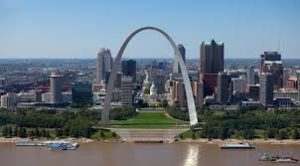 Further, just a few days following the previously mentioned ruling, Judge Limbaugh granted the Plaintiff’s motion to have the case remanded back to state court.[185] In making this determination, Judge Limbaugh cited the local controversy exception, which establishes that a “district court must decline to exercise jurisdiction over a class action . . . .”[186] A district court, in following the local controversy exception, may not exercise jurisdiction over a class action
Further, just a few days following the previously mentioned ruling, Judge Limbaugh granted the Plaintiff’s motion to have the case remanded back to state court.[185] In making this determination, Judge Limbaugh cited the local controversy exception, which establishes that a “district court must decline to exercise jurisdiction over a class action . . . .”[186] A district court, in following the local controversy exception, may not exercise jurisdiction over a class action
(1) in which more than two-thirds of the class members in the aggregate are citizens of the state in which the action was originally filed, (2) at least one significant defendant is a citizen of the state in which the class action was originally filed, (3) the principal injuries were incurred in the state in which the action was filed, and (4) no other class action alleging similar facts was filed in the three years prior to the commencement of the current class action.[187]
There was no dispute over whether factors two, three, and four were present; the issue was whether more than two-thirds of the class members are Missouri citizens.[188] To determine whether two-thirds of class was Missouri citizens, the district court allowed the Plaintiffs to employ an expert to conduct a report in regard to the citizenship of the Class.[189] In collecting data for the report, the expert asked the Class members a series of questions, such as whether they made relevant purchases from the Rams during the Class period, if they resided in the state when they made the purchase, and if they intend to continue to reside in the state.[190] The report returned a result which stated that of the 107 responses received, 86.7% of the class members were indeed Missouri citizens.[191] The Rams failed to rebut and discredit the expert’s survey and report, and for these reasons on March 21, 2018, Judge Limbaugh ordered that the case be remanded to the Circuit Court for the City of St. Louis Missouri.[192]
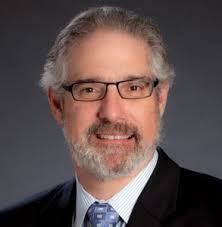 David Bohm (Bohm), an attorney at Danna McKitrick, P.C. with vast experience in the legal areas surrounding employment disputes, intellectual property, health care, and government, was called upon to not only identify appropriate members of the Class, but to also work to address this novel issue with PSLs.[193] For Bohm, this case was so unique because in his understanding, “there had never been another litigation involving PSLs putting them in novel territory regarding their approach.”[194] In tackling this novel issue, Bohm not only leaned upon the attorneys of each class before the case was consolidated, but also felt that the arguments that made the case for each class was the Best Interest clause for the Rams Class and the Court’s belief that a partial refund was clearly owed to those of the FANS Class.[195]
David Bohm (Bohm), an attorney at Danna McKitrick, P.C. with vast experience in the legal areas surrounding employment disputes, intellectual property, health care, and government, was called upon to not only identify appropriate members of the Class, but to also work to address this novel issue with PSLs.[193] For Bohm, this case was so unique because in his understanding, “there had never been another litigation involving PSLs putting them in novel territory regarding their approach.”[194] In tackling this novel issue, Bohm not only leaned upon the attorneys of each class before the case was consolidated, but also felt that the arguments that made the case for each class was the Best Interest clause for the Rams Class and the Court’s belief that a partial refund was clearly owed to those of the FANS Class.[195]
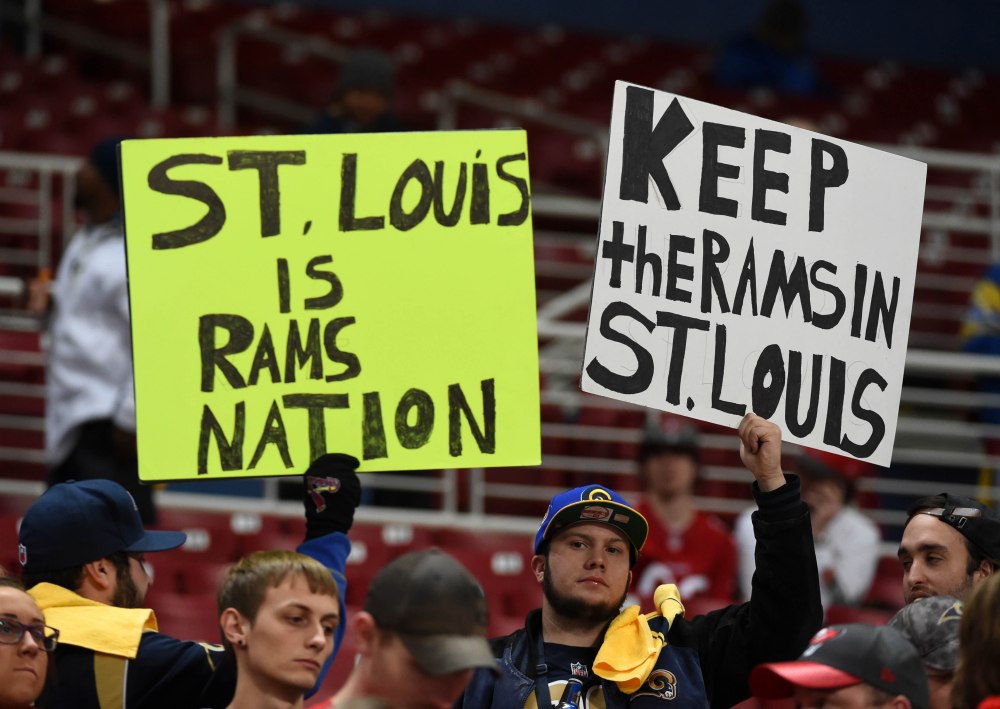 Finally, on December 5, 2018, the Plaintiffs in the class-action suit brought forth a settlement agreement to be approved by the Court. Described as “fair, reasonable and adequate,” and after working with a mediator, the settlement offer looked to provide each member of the Class with “a substantial cash payment . . . [of] hundreds or thousands of dollars depending on the seat location of their [PSL].”[196] The request made was that the payment be for 30% of the price of the Plaintiff’s PSLs (i.e., the face value), with a cap of $12 million per Class (i.e., $24 million total).[197] The money for the FANS Class would represent a “pro-rata refund based on the remaining [nine] years of their PSLs”, while the money for the Rams Class closely aligned with the damages recommended by their expert.[198] This settlement agreement was thought by the Plaintiffs to represent fair compensation of what the fans “had paid for and did not get” from the Rams[199] and accomplished the goal of obtaining “as much compensation as possible for Class members.”[200] When specifically considering the FANS Class, “with a lack of the Best Efforts Clause, this reimbursement is . . . what [these members] had asked for.”[201] Moreover, the amount requested in the settlement would not be in anyway hindered by attorneys’ fees or other expenses, as the Rams organization had agreed separately to pay for these costs and expenses.[202] The total pay-out for each member of the Class following the settlement agreement is as follows:
Finally, on December 5, 2018, the Plaintiffs in the class-action suit brought forth a settlement agreement to be approved by the Court. Described as “fair, reasonable and adequate,” and after working with a mediator, the settlement offer looked to provide each member of the Class with “a substantial cash payment . . . [of] hundreds or thousands of dollars depending on the seat location of their [PSL].”[196] The request made was that the payment be for 30% of the price of the Plaintiff’s PSLs (i.e., the face value), with a cap of $12 million per Class (i.e., $24 million total).[197] The money for the FANS Class would represent a “pro-rata refund based on the remaining [nine] years of their PSLs”, while the money for the Rams Class closely aligned with the damages recommended by their expert.[198] This settlement agreement was thought by the Plaintiffs to represent fair compensation of what the fans “had paid for and did not get” from the Rams[199] and accomplished the goal of obtaining “as much compensation as possible for Class members.”[200] When specifically considering the FANS Class, “with a lack of the Best Efforts Clause, this reimbursement is . . . what [these members] had asked for.”[201] Moreover, the amount requested in the settlement would not be in anyway hindered by attorneys’ fees or other expenses, as the Rams organization had agreed separately to pay for these costs and expenses.[202] The total pay-out for each member of the Class following the settlement agreement is as follows:
| PSL Tier Price in the Stadium[203] | Pay-Out for Qualified Claim |
| $250 | $75 |
| $500 | $150 |
| $1,000 | $300 |
| $2,500 | $750 |
| $3,000 | $900 |
| $4,500 | $1,350 |
Within the settlement offer made to the Court, the parties on both sides of the case made strong and convincing arguments as to how their settlement met the requirements of Federal Rule of Civil Procedure 23 (i.e., the rule governing judicial review of settlements) and why it should be approved.[204]
 The arguments and figures presented in the motion appear to have been deemed equitable, because recently Judge Limbaugh granted preliminary approval of the settlement agreement.[205] Bohm stated that even those who had purchased a PSL, but did not continue to purchase season tickets to Rams games in St. Louis could potentially receive a settlement payout; to qualify as a member of the Class and receive a portion of the payout, one simply has to show that they had never received a letter from the Rams terminating their PSL.[206] The website for qualified members to file a claim was expected to go live on February 16, 2019, with all claims needing to be filed by August 23, 2019.[207] The Court conducted its Final Approval Hearing for the proposed settlement on June 24, 2019, where the offer given was approved by Judge Limbaugh, who referred to this as a “‘hotly contested case’ that was ‘resolved in a satisfactory way . . . .’” [208] It should be noted that as part of the settlement, St. Louis Rams, LLC will be paying a total of $7.2 million in attorneys’ fees to the Class Action Plaintiffs.[209]
The arguments and figures presented in the motion appear to have been deemed equitable, because recently Judge Limbaugh granted preliminary approval of the settlement agreement.[205] Bohm stated that even those who had purchased a PSL, but did not continue to purchase season tickets to Rams games in St. Louis could potentially receive a settlement payout; to qualify as a member of the Class and receive a portion of the payout, one simply has to show that they had never received a letter from the Rams terminating their PSL.[206] The website for qualified members to file a claim was expected to go live on February 16, 2019, with all claims needing to be filed by August 23, 2019.[207] The Court conducted its Final Approval Hearing for the proposed settlement on June 24, 2019, where the offer given was approved by Judge Limbaugh, who referred to this as a “‘hotly contested case’ that was ‘resolved in a satisfactory way . . . .’” [208] It should be noted that as part of the settlement, St. Louis Rams, LLC will be paying a total of $7.2 million in attorneys’ fees to the Class Action Plaintiffs.[209]
- Conclusion
Sporting event tickets are understood to be revocable licenses, providing access to each individual game and providing the organization with enough leeway to deny access, the organizations hold most of the power in determining what goes in within the stadium walls.[210] When a season ticket holder and the average fan enters a stadium, their rights are equally restricted by organization through the terms of the license found on the back of the ticket; each and every fan agrees to these terms when they purchase their ticket.[211]
As shown through numerous cases over the years, the rights of season ticket holders begins and ends in the terms and conditions section of their agreements with the respective organization.[212] Many season ticket holders feel that because they hold access to renewal of their season tickets, this creates a property right; an overwhelming amount of professional organizations, and also a few universities, have constructed language to make it well-known to season ticket holders that their privilege to renewal is nothing more than a privilege, does not create a property right, and may be revoked at any time.[213]
In the case of PSL holders, a property interest is extremely difficult to determine. While organizations have built in language to the PSL terms and conditions in attempts to state a property right does not exist, the functions of a PSL speak to the contrary. The rights afforded to a PSL holder, namely the right to exclude and transfer, establishes the strongest claim that a PSL holder may in fact hold a property interest to their seats in a stadium.
Both season ticket holders and PSL holders should consult with the “Terms and Conditions” of their agreement with the organization to determine if a property right to a seat or tickets has been created, but it is important to keep in mind that most organizations have built in language to restrict a property right from ever flourishing.
Attachment: The Fans and regular CPL agreement will be attached to the final article.
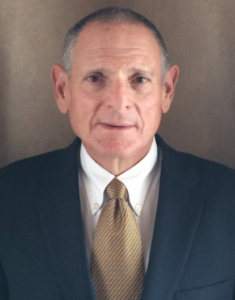

A special thank you to good friends, Les Weil and Freddy Steinbach, in helping to make this article a possibility, and for arranging direct contact and interviews with Steve Lowy and Attorney David Bohm.
Jordan Lysiak is a graduate of Marquette University Law School and a recipient of the Certificate in Sports Law in addition to his Juris Doctor. During his time at Marquette, Lysiak served as the Articles and Survey Editor of the Marquette Sports Law Review (Volumes 28 and 29), the Vice Chair of the Marquette Intramural Sports Law Negotiation Competition, and as a competitor in the Tulane International Baseball Arbitration Competition. He also held roles as a Compliance Intern for the University of Wisconsin-Milwaukee athletics department, an Extern with the Office of the Committees on Infractions at the NCAA, a Compliance Intern at Rutgers University athletics department, and a research assistant for the National Sports Law Institute. Lysiak’s non-sports law experience included a student associate position with the Marquette Law and Entrepreneurship Clinic. Prior to his time at Marquette, Lysiak earned his bachelor’s degree from Florida State University, with a major in political science and a minor in sociology of law.
[1] St. Louis Rams Relocate to Los Angeles, ESPN (Jan. 13, 2016), http://www.espn.com/nfl/story/_/id/14558668/st-louis-rams-relocate-los-angeles; https://www.si.com/2016/01/13/nfl-st.louis-rams-fans-react-nfl-los-angeles; Zachary Zagger, Rams Say St. Louis Ticket Rights Don’t Transfer To LA, Law 360 (Apr. 5, 2016), https://www.law360.com/articles/780575/rams-say-st-louis-ticket-rights-don-t-transfer-to-la (The Rams stated that “personal seat license agreements make it clear that the right to purchase season tickets does not carry over to Los Angeles . . . “).
[2] Seizure and Sale of Right to Renew Season Tickets, Internal Revenue Service, https://www.irs.gov/pub/irs-lafa/092102f.pdf (last visited July 28, 2019); Archer Norris, Season Tickets Cannot Be Seized, Lexology (Nov. 3, 2010), https://www.lexology.com/library/detail.aspx?g=61a993af-08c3-4722-900e-b64f8101ffb5. Something that seems to somewhat remain prevalent is that one should refer to the specific season ticket holder agreement of each individual team to determine if there is a property right and if the team may revoke this right at any time.
[3] Id.
[4] Terms and Conditions, Los Angeles Rams, https://losangelesramsportal.io-media.com/terms-conditions-1 (last visited July 28, 2019).
[5] Internal Revenue Service, supra note 2 (“[I]f a team follows a policy which restricts transfers of the season ticket renewals by the holder, the holder does not have a right to property. However, where the teams readily allow holders to transfer ticket renewals . . . a [property] right may exist.”).
[6] Charpentier v. L.A. Rams Football Co., 75 Cal. App. 4th 301 (Cal. Ct. App. 1999); see generally In re I.D. Craig Service Corp., 138 B.R. 490 (Bankr. Ct. W.D. Pa. 1992); Frager v. Indianapolis Colts, Inc., 2016 U.S. Dist. LEXIS 155228 (S.D. Ind. Nov. 9, 2016); see generally Brotherson v. Prof’l Basketball Club, L.L.C., 604 F. Supp. 2d 1276 (W.D. Wash. 2009); see generally Soderholm v. Chicago Nat’l League Ball Club, 225 Ill. App. 3d 119 (Ill. App. Ct. 1992); In re: William v. Harrell, Find Law, http://caselaw.findlaw.com/us-9th-circuit/1306981.html (last visited July 28, 2019).
[7] Id. In Craig, it was held that season tickets were improperly revoked because the individual held a reasonable expectation that they would continue to have access to purchase the season tickets in the future. In Frager, a 2016 case, it was held that an individual having a reason to believe that they will be given the option to repurchase season tickets was not enough to prove a taking worthy of compensation.
[8] Brian Tuohy, When Fans Sue Sports Leagues, They Rarely Win, Sports on Earth (Jan. 29, 2014), http://www.sportsonearth.com/article/67208330/when-fans-sue-courts-always-favor-the-leagues; Dan Fitzgerald, Can They Take My Tickets?The Legal Rights of Sports Teams and Fans, Connecticut Sports Law (Oct. 22, 2008), https://ctsportslaw.com/2008/10/22/can-they-take-my-tickets-the-legal-rights-of-sports-teams-and-fans/.
[9] Id.; Patrick M. O’Connell, Fight Between Cubs Fan, Team Highlights Tenuous Ownership of Season Tickets, Chicago Tribune (Dec. 20, 2016), http://www.chicagotribune.com/sports/baseball/cubs/ct-cubs-season-tickets-revoked-met-20161220-story.html (Agreement between the organization and the fans “states that the team can revoke a person’s ticket for any reason at any time, a concept known as ‘revocable license.’”). A revocable license can be defined as a grant of consent to use another’s property that can be revoked by the issuer at any time, with or without consent.
[10] Tuohy, supra note 8.
[11] Fitzgerald, supra note 8.
[12] Id.
[13] Green Bay Packers vs. New Orleans Saints – Lambeau Field, Green Bay Packers (Oct. 22, 2017).
[14] Milwaukee Brewers vs. San Francisco Giants – Miller Park, Milwaukee Brewers (Jun. 5, 2017).
[15] Milwaukee Admirals vs. Chicago Wolves – UW-Milwaukee Panther Arena, Milwaukee Admirals (Dec. 10, 2016).
[16] Florida State University vs. University of North Carolina – Donald L. Tucker Civic Center, Florida State Athletics (Jan. 4, 2016).
[17] Chicago Bulls vs. Milwaukee Bucks – United Center, Chicago Bulls (Dec. 16, 2016).
[18] NFL Teams Implement Fan Code of Conduct, National Football League, http://www.nfl.com/news/story/09000d5d809c28f9/article/nfl-teams-implement-fan-code-of-conduct (last visited July 28, 2019); NBA Fan Code of Conduct, National Basketball Association, http://www.nba.com/nba-fan-code-of-conduct#/ (last visited July 28, 2019); NHL Fan Code of Conduct, San Jose Sharks, https://www.nhl.com/sharks/fans/code-of-conduct (last visited July 28, 2019) (While this is a page for an individual team, the San Jose Sharks, this NHL Fan Code of Conduct is the same throughout the league, regardless of the team).
[19] Id.
[20] Scott Lauber, MLB to Implement Universal Code of Conduct for Fans at Stadiums in 2018, ESPN (Aug. 23, 2017), http://www.espn.com/mlb/story/_/id/20419845/mlb-implement-code-conduct-fans-ballparks-2018.
[21] Id.
[22] Jason Owens, Sources: Celtics Fan Who Uttered Racial Slur at DeMarcus Cousins Banned from TD Garden, Yahoo! Sports (Mar. 28, 2019), https://sports.yahoo.com/source-celtics-fan-who-uttered-racial-slur-at-de-marcus-cousins-banned-from-td-garden-015907266.html.
[23] Id. A similar situation occurred later in the 2018-19 NBA season when a Utah Jazz fan directed “excessive and derogatory verbal abuse” at Oklahoma City Thunder guard Russell Westbrook. Id. The Jazz responded to this situation by banning the fan for life. Id.
[24] The MLB is still working on establishing their own bright-line rules.
[25] NFL Teams Implement Fan Code of Conduct, supra note 18.
[26] NBA Fan Code of Conduct, supra note 18.
[27] NHL Fan Code of Conduct, supra note 18.
[28] MLS Fan Code of Conduct, https://www.mlssoccer.com/fan-code-of-conduct (last visited May 15, 2019).
[29] Fan Code of Conduct, Green Bay Packers, http://www.packers.com/gameday/fan-conduct.html (last visited July 28, 2019).
[30] Fan Code of Conduct, Minnesota Vikings, http://www.vikings.com/stadium/fan-code-of-conduct.html (last visited July 28, 2019).
[31] Chicago Bulls Fan Code of Conduct, Chicago Bulls, http://www.nba.com/bulls/tickets/conduct_0405.html (last visited July 28, 2019); NBA Fan Code of Conduct, Milwaukee Bucks, http://www.nba.com/bucks/nba-fan-code-conduct (last visited July 28, 2019).
[32] The Fenway Park Code of Conduct, Boston Red Sox, https://www.mlb.com/redsox/ballpark/information/code-of-conduct (last visited July 28, 2019).
[33] Fan Code of Conduct, Dodger Stadium, https://www.mlb.com/dodgers/ballpark/information/code-of-conduct (last visited July 28, 2019).
[34] San Francisco Giants, Fans Don’t Let Fans Drive Drunk, https://fansdontletfansdrivedrunk.org/team/mlb/san-francisco-giants/ (last visited July 28, 2019).
[35] Guest Code of Conduct, New York Yankees, https://www.mlb.com/yankees/ballpark/information/conduct (last visited July 28, 2019).
[36] Madison Square Garden Rules, Madison Square Garden, http://www.madisonarena.com/madison-square-garden-rules/ (last visited July 28, 2019).
[37] Mike Chiari, Knicks Release Statement After TMZ Video Emerges of James Dolan Ejecting Fan, Bleacher Report (Mar. 9, 2019), https://bleacherreport.com/articles/2824772-knicks-release-statement-after-tmz-video-emerges-of-james-dolan-ejecting-fan.
[38] Id.
[39] Id.
[40] Marcus Dinitto, Anti-Dolan Knicks Fan Got Kicked Out of MSG Before Charles Oakley Did, Sporting News (Feb. 12, 2017), https://www.sportingnews.com/us/nba/news/charles-oakley-james-dolan-knicks-msg-security-fan-ejected-clippers-game/1936zzp9d7nq21ox5t2w8sw27k.
[41] Ian Begley, Knicks Owner James Dolan Gets in Verbal Spat with Fan Outside MSG, ESPN (Apr. 6, 2017), http://www.espn.com/nba/story/_/id/19089382/new-york-knicks-owner-james-dolan-involved-verbal-exchange-fan-madison-square-garden.
[42] Report: Celtics Fan Banned From TD Garden for 2 Years for Directing Racial Slur at DeMarcus Cousins, CBS Boston (Mar. 28, 2019), https://boston.cbslocal.com/2019/03/28/demarcus-cousins-boston-celtics-fan-banned-racial-slur-nba/.
[43] Id.
[44] Jill Martin, NBA Bans and Levies Huge fine Against Warriors Investor Who Pushed Kyle Lowry During NBA Finals, CNN Sports (June 7, 2019), https://www.cnn.com/2019/06/06/sport/kyle-lowry-pushed-by-warriors-investor-mark-stevens-spt-intl/index.html.
[45] Id.
[46] Id.
[47] Id.
[48] Id.
[49] Id.
[50] Id.
[51] Id.
[53] Jeff Zillgitt, Warriors Minority Owner Mark Stevens Banned One Year, Fined $500K for Pushing Kyle Lowry, USA Today (June 6, 2019), https://www.usatoday.com/story/sports/nba/2019/06/06/nba-finals-man-pushed-kyle-lowry-part-owner-warriors/1367336001/.
[54] Daniel Kaplan, NFL: Fans Ejected from Stadium Will Now Be Barred from Others, Sports Bus. J. (Dec. 15, 2014), https://www.sportsbusinessdaily.com/Journal/Issues/2014/12/15/Leagues-and-Governing-Bodies/NFL-security.aspx.
[55] Id.
[56] Id.
[57] Id.
[58] Id.
[59] Craig Calcaterra, Adam Jones has Fan Ejected from Petco Park, NBC Sports (Apr. 4, 2019), https://mlb.nbcsports.com/2019/04/04/adam-jones-has-fan-ejected-from-petco-park/.
[60] Luis Torres, NHL Playoffs: Dallas Stars Fan Ejected from Seat Next to Penalty Box Before Third Period, Tennessean (Apr. 16, 2019), https://www.tennessean.com/story/sports/nhl/predators/2019/04/15/nhl-playoffs-dallas-stars-fan-ejection-austin-watson-penalty-box-altercation-nashville-predators/3481375002/.
[61] Id.
[62] Miles Blumhardt, Triple Crown Stiffens Fan Ejection Policy to Combat Growing Problems, Coloradoan (June 9, 2018), https://www.coloradoan.com/story/sports/2018/06/09/triple-crown-sports-stiffens-fan-ejection-policy-combat-growing-problem/687396002/.
[63] Id.
[64] Id.
[65] Id.
[66] Id.
[67] Richard Ryman, Packers Fan’s Lawsuit Against Chicago Bears Gets Go-Ahead from Court, Green Bay Press Gazette (Apr. 25, 2018), https://www.greenbaypressgazette.com/story/news/2018/04/25/packers-fans-lawsuit-against-chicago-bears-gets-go-ahead-court/521984002/.
[68] Id.
[69] Id.
[70] Id.
[71] Id.
[72] Judge Blocks Fan from Wearing Packers Gear During Warm-Ups, NBC Chicago (Dec. 13, 2018), https://www.nbcchicago.com/blogs/grizzly-detail/chicago-bears-green-bay-packers-judge-rules-against-fan-502736201.html.
[73] Id.
[74] Darren Rovell, NFL Gets Serious About Fan Conduct, ESPN (Aug. 17, 2012), https://www.espn.com/nfl/story/_/id/8278886/nfl-require-ejected-fans-take-online-fan-conduct-course.
[75] Id.
[76] Id.
[77] Id.
[78] Id.
[79] 4 Hour Online Fan Code of Conduct Class, Fan Conduct Class, https://www.fanconductclass.com/nfl/lambeaufield.aspx (last visited July 28, 2019).
[80] Id.
[81] Id.
[82] Id.
[83] Internal Revenue Service, supra note 2; Norris, supra note 2.
[84] Internal Revenue Service, supra note 2 (Bankruptcy courts have reached differing opinions; some found that the renewal is a revocable license and not a property right, and others have found that renewals are property); Craig (The team always automatically allowing for renewal of season tickets creates a property right for the season ticket holder); Yehuda Frager v. Indianapolis Colts Inc, Find Law, http://caselaw.findlaw.com/us-7th-circuit/1865337.html (last visited July 28, 2019) (“[A] season-ticket holder has no right to future season tickets unless the Colts sold them that right in the first place, and the ticket contract forecloses that possibility”); Fitzgerald, supra note 8 (Season ticket subscriptions do not provide a legal right to renewal).
[85] See generally Craig, 138 B.R. at 490; Internal Revenue Service, supra note 2.
[86] Craig, 138 B.R. at 492.
[87] Id.
[88] Id. at 52.
[89] Id.
[90] Yehuda Frager, supra note 59; Olivia Covington, Judge Initially Dismisses Ticket Broker Suit Against Colts, The Indiana Lawyer (Nov. 10, 2016), https://www.theindianalawyer.com/articles/41975-judge-initially-dismisses-ticket-broker-suit-against-colts (Colts have a policy that each ticket is a revocable license for entry into the stadium and that the organization holds the right to reject renewal).
[91] Frager, 2016 U.S. Dist. LEXIS 155228 at 2.
[92] Id.
[93] Id. at 3.
[94] Id. at 5-6.
[95] Yehuda Frager v. Indianapolis Colts, Inc., Justia, https://dockets.justia.com/docket/circuit-courts/ca7/16-4183 (last visited July 28, 2019).
[96] Internal Revenue Service, supra note 2; Norris, supra note 2.
[97] Season Ticket Member Standard Terms & Conditions, Sacramento Kings, http://www.nba.com/kings/season-ticket-terms-conditions (last visited July 28, 2019); Season Ticket Policies, Denver Broncos, http://www.denverbroncos.com/tickets/season_ticket_policies.html (last visited July 28, 2019); Season Ticket Terms, Atlanta Falcons, https://tickets.atlantafalcons.com/ticket-terms/ (last visited July 28, 2019); Member Benefits & Policies, Miami Dolphins, http://www.miamidolphins.com/tickets-and-stadium/Terms.html (last visited July 28, 2019); Membership – Terms and Conditions, Philadelphia 76ers, http://www.nba.com/sixers/2016-17-membership-terms-conditions (last visited July 28, 2019); Ticket Holder Policies and Procedures, University of Arizona Wildcats, http://arizonawildcats.com/sports/2013/4/18/208230951.aspx (last visited July 28, 2019); Season Ticket Account Policies, Kansas City Royals, https://www.mlb.com/royals/tickets/season-tickets/holders/policies (last visited July 28, 2019); William v. Harrell, supra note 6.
[98] Revocable License, Quimbee, https://www.quimbee.com/keyterms/revocable-license (last visited July 28, 2019). A “revocable license” has been defined as a “grant of consent to use another’s property that can be revoked by the licensor at any time with or without cause.”
[99] Id.; Olivia Covington, 7th Circuit: Colts Not Required To Renew Season Tickets, The Indiana Lawyer (Jun. 23, 2017), https://www.theindianalawyer.com/articles/44076-th-circuit-colts-not-required-to-renew-season-tickets (Clause in the contract between the Colts and purchaser that says “the Colts reserve the right . . . to reject any order, transfer, or renewal”).
[100] Sacramento Kings, supra note 97.
[101] Denver Broncos, supra note 97.
[102] Atlanta Falcons, supra note 97.
[103] Miami Dolphins, supra note 97.
[104] Philadelphia 76ers, supra note 97.
[105] University of Arizona Wildcats, supra note 97.
[106] Kansas City Royals, supra note 97.
[107] William v. Harrell, supra note 6.
[108] Pistons Member Terms, Detroit Pistons, http://www.nba.com/pistons/terms (last visited July 28, 2019).
[109] General Admission Season Ticket Terms and Conditions, Arsenal https://www.arsenal.com/sites/default/files/documents/17.05.22%20-%20GA%20Season%20Ticket%20T%26Cs%20%282017-18%291.pdf (last visited July 28, 2019).
[110] 2018 Season Ticket Terms & Conditions, Arizona Diamondbacks, http://m.dbacks.mlb.com/promo/seasonticketterms (last visited July 28, 2019).
[111] Season Pass Terms and Conditions and Arbitration Agreement, Tampa Bay Buccaneers, https://www.buccaneers.com/ticketterms (last visited July 28, 2019).
[112] Chicago Cubs Season Ticket License – Full Terms and Conditions, Chicago Cubs, https://www.mlb.com/cus/tickets/season-tickets/holders/terms-and-conditions (last visited July 28, 2019).
[113] Auto-Renewal Terms & Conditions, Minnesota United FC, https://www.mnufc.com/tickets/season-tickets/auto-renewal-terms-conditions (last visited July 28, 2019).
[114] Arizona Diamondbacks, supra note 110; John Lombardo, Cavaliers First in NBA To Require Automatic Renewal, Sports Business Journal (Mar. 2, 2015), https://www.sportsbusinessdaily.com/Journal/Issues/2015/03/02/Franchises/Cavaliers-auto-renewal.aspx; O’Connell, supra note 9.
[115] Lombardo, supra note 114.
[116] Minnesota United FC, supra note 113.
[117] O’Connell, supra note 9. Fans are notified that their tickets may be cancelled if it is found that the purpose of purchasing season tickets is to resell the tickets.
[118] Fitzgerald, supra note 8.
[119] Tuohy, supra note 8.
[120] Picking the Right Fight with Green Bay Green-and-Gold, Chi. Trib. (Dec. 5, 2018), https://www.chicagotribune.com/news/opinion/editorials/ct-edit-bears-packers-fan-lawsuit-20181205-story.html (where the Chicago Bears denied a Green Bay Packers fan, who was also a Chicago Bears season ticket holder, pregame sideline access, a privilege afforded to other season ticket holders, because of a policy in place that restricts field access for those wearing gear of the opposing team); Corilyn Shropshire, A Packers Fan is Suing to Wear Green Bay Gear on Soldier Field’s Sidelines. Now the Bears Say the Pregame Perk is Over., Chi. Trib. (Feb. 5, 2019), https://www.chicagotribune.com/business/ct-biz-bears-season-ticket-holder-perk-cancelled-20190205-story.html (as a way to respond to the lawsuit filed by the Green Bay fan and Chicago season ticket holder, the organization chose to cancel the program entirely); Packers Fan Loses Bid to Wear Team Colors on Sidelines for Sunday’s Chicago Bears Game, WGN (Dec. 14, 2018), https://wgntv.com/2018/12/14/packers-fan-loses-bid-to-wear-team-colors-on-sidelines-for-sundays-chicago-bears-game.
[121] Sacramento Kings, supra note 97.
[122] Denver Broncos, supra note 97.
[123] LA Chargers Season Ticket Policy, Los Angeles Chargers, http://www.chargers.com/tickets/la-chargers-season-ticket-policy (last visited July 28, 2019).
[124] Arsenal, supra note 109.
[125] A season ticket holder agreement can typically include a payment plan, automatic ticket renewal terms, access to playoff tickets, account ownership information, season ticket transfer, relocation, and resale information, the behavior expected from fans, release of liability for the team or club, limited transfer policy surrounding the filing for bankruptcy by the season ticket holder, fan code of conduct, and the scope of the license.
[126] The displayed list of the elements generally found within Season Ticket Holder Agreements was compiled and created by Martin J. Greenberg.
[127] Danette R. Davis, The Myth & Mystery of Personal Seat Licenses and Season Tickets: Licenses or More?, 51 St. Louis U. L.J. 241, 257 (2006).
[128] Id.
[129] Id.
[130] Id.
[131] Id.
[132] St. Louis Rams, Regular Patron CPSL Agreement 2 (2005).
[133] Giants Stadium LLC Personal Seat License (PSL) Agreement, New York Giants, https://nygiants.strmarketplace.com/Images/library/new-york-giants/psl%20agreement.pdf (last visited July 28, 2019).
[134] Permanent Seat License Terms and Conditions, Houston Texans, https://texans.seasonticketrights.com/Images/library/houston-texans/psl-terms-and-conditions.pdf (last visited July 28, 2019).
[135] Personal Seat License Agreement, New York Jets, http://prod.static.jets.clubs.nfl.com/assets/docs/01172018_Personal_Seat_License_Agreement.pdf (last visited July 28, 2019). This language was recently utilized in a U.S. District court case where a Jets PSL purchaser attempted to claim that by the Jets’ actions in selling 200-level seats to the general public, rather than strictly maintaining them for PSL holders, the team had “made his PSLs worthless.” U.S. District Judge Stanley Chesler, referencing this very language, stated that the PSL contract does not convey any exclusive language, it is clearly shown that the PSL is not treated as an investment for PSL purchasers, and, put simply, the plaintiff did in fact obtain the “’reasonably expected fruits under the contract.’” Christine Stuart, Jets Fan Loses Suit Over Value of Seat License, Courthouse News (Aug. 31, 2018), https://www.courthousenews.com/jets-fan-loses-suit-over-value-of-seat-license/.
[136] Washington Redskins Premium Seating Terms and Conditions, Washington Redskins, http://prod.static.redskins.clubs.nfl.com/assets/docs/Premium-Seating-Online-Terms-and-Conditions.pdf (last visited July 28, 2019).
[137] Davis, supra note 127, at 245.
[138] Id.
[139] Id. at 252.
[140] Id.
[141] Id.
[142] Jeanna Thomas, Broncos Fans Disappointed by Team’s New Policy to Revoke Season Tickets, SB Nation (Jul. 17, 2017), https://www.sbnation.com/2017/7/17/15985000/broncos-fans-disappointed-policy-revoke-season-tickets.
[143] Id.
[144] Davis, supra note 127, at 252.
[145] Id. at 257-58.
[146] Id.
[147] Id.
[148] Jim Salter, Seat License Holders Sue Rams Over Access to LA Seats, Business Insider (Jan. 21, 2016), https://www.businessinsider.com/ap-seat-license-holders-sue-rams-over-access-to-la-seats-2016-1.
[149] Emily Caron, When Did the Rams Move to Los Angeles, Sports Illustrated (Jan. 20, 2019), https://www.si.com/nfl/2019/01/20/when-did-rams-move-los-angeles-franchise-history-locations.
[150] Salter, supra note 148.
[151] Kristen Taketa, Personal Seat License Holders Sue Rams, St. Louis Post – Dispatch (Jan. 21, 2016), http://www.stltoday.com/news/local/illinois/personal-seat-license-holders-sue-rams/article_0d6e239f-639a-5d95-b20e-14e514e074e9.html.
[152] Ashley Milano, St. Louis Rams Class Action Lawsuits Consolidated, Top Class Actions (Jul. 8, 2016), https://topclassactions.com/lawsuit-settlements/lawsuit-news/339617-st-louis-rams-class-action-lawsuits-consolidated/.
[153] Ronald McAllister v. St. Louis Rams, 209 F. Supp. 3d 1121, 1124-27 (2016).
[154] Telephone Interview with Steve Lowy, Chairman, Envision, LLC (Feb. 20, 2019).
[155] Envision LLC, http://www.envision.com (last visited July 28, 2019).
[156] Telephone Interview with Steve Lowy, Chairman, Envision, LLC (Feb. 20, 2019).
[157] Id.
[158] Ronald McAllister v. St. Louis Rams, 209 F. Supp. 3d 1121, 1124-27 (2016).
[159] Id.
[160] Id.
[161] Id.
[162] Id.
[163] McAllister, 209 F. Supp. 3d at 1124-1127.
[164] Id.
[165] Id.
[166] Id.
[167] Id.
[168] Id.
[169] McAllister, 209 F. Supp. 3d at 1124-1127.
[170] McAllister, 209 F. Supp. 3d at 1124-27.
[171] Id. at 1127.
[172] Id.
[173] Id. at 1127-28.
[174] Id.
[175] Id. at 1128.
[176] McAllister, 209 F. Supp. 3d at 1128-29.
[177] Id.
[178] Id. at 1129.
[179] Id.
[180] Adam Rhodes, Rams Fans Win Cert., Lose Quick Win Bid in LA Move Fight, Law 360 (Mar. 14, 2018), https://www.law360.com/articles/1021822/rams-fans-win-cert-lose-quick-win-bid-in-la-move-fight.
[181] Id.
[182] Id.
[183] Id.
[184] Id.
[185] McAllister v. St. Louis Rams, No. 4:16-CV-172 SNLJ, 2018 U.S. Dist. LEXIS 48771, at *15-16 (E.D. Mo. Mar. 21, 2018).
[186] Id. at *8.
[187] Id.
[188] Id. at *8-9.
[189] Id. at *9.
[190] Id. at *10.
[191] McAllister, 2018 U.S. Dist. LEXIS 48771, at *10-11.
[192] Id. at *11 and *16.
[193] David R. Bohm, Danna McKitrick, P.C., https://www.dannamckitrick.com/david-r-bohm (last visited July 28, 2019); Telephone Interview with David R. Bohm, Principle, Danna McKitrick, P.C. (Feb. 28, 2019).
[194] Telephone Interview with David R. Bohm, Principle, Danna McKitrick, P.C. (Feb. 28, 2019). Before the consolidation of the classes, Mr. Bohm represented the members of the Rams Class, while other attorneys took the lead on representing the FANS Class. Id.
[195] Id.
[196] Plaintiff’s Motion for Preliminary Approval of Settlement and Incorporated Memorandum in Support at 8, McAllister v. St. Louis Rams, LLC, No.: 4:16-cv-00172-SNLJ (E.D. Mo. Dec. 5, 2018).
[197] Id.
[198] Id. at 8-9.
[199] Telephone Interview with David R. Bohm, Principle, Danna McKitrick, P.C. (Feb. 28, 2019).
[200] Id.
[201] Id.
[202] Plaintiff’s Motion for Preliminary Approval of Settlement and Incorporated Memorandum in Support at 9, McAllister v. St. Louis Rams, LLC, No.: 4:16-cv-00172-SNLJ (E.D. Mo. Dec. 5, 2018); If You Qualify for a Rams PSL Refund, the Website for Claims Will Go Live in February, St. Louis Post-Dispatch (Jan. 25, 2019), https://www.stltoday.com/sports/football/professional/if-you-qualify-for-a-rams-psl-refund-the-website/article_42ec1b32-fd70-52ed-a3fa-05cde8b6f27c.html. It has been reported that the Rams will pay up to $7.4 million in attorneys’ fees and expenses for the Plaintiffs.
[203] Plaintiff’s Motion for Preliminary Approval of Settlement and Incorporated Memorandum in Support at 19, McAllister v. St. Louis Rams, LLC, No.: 4:16-cv-00172-SNLJ (E.D. Mo. Dec. 5, 2018).
[204] Id. at 24-43.
[205] St. Louis Rams PSL Holders Settlement Agreement Update, Danna McKitrick, P.C. (Feb. 5, 2019), https://www.dannamckitrick.com/st-louis-rams-psl-holders-settlement-agreement-update.
[206] Id.
[207] Hana Muslic, With Class-Action Settlement, Rams’ PSL Holders Can Get Some of Their Money Back, Belleville News-Democrat (Feb. 4, 2019), https://www.bnd.com/news/local/article225033735.html.
[208] Robert Patrick, Judge Approves St. Louis Rams Seat License Holder Settlement of Up to $24 Million; Deadline to File is Aug. 23, St. Louis Today (Jun. 24, 2019), https://www.stltoday.com/sports/football/professional/judge-approves-st-louis-rams-seat-license-holder-settlement-of/article_acc10803-7f45-5aae-bd64-e03251e6d8ed.html. It seems somewhat reasonable to anticipate payments to begin to be distributed by the end of 2019.
[209] Rams Must Pay $7.2M In Atty Fees In Seat License Suit, Law360.com, (Jun. 25, 2019), https://www.law360.com/articles/1172321/rams-must-pay-7-2m-in-atty-fees-in-seat-licenses-suit.
[210] Fitzgerald, supra note 8.
[211] Id.
[212] Internal Revenue Service, supra note 2; Norris, supra note 2.
[213] Tuohy, supra note 8; Fitzgerald, supra note 8.
